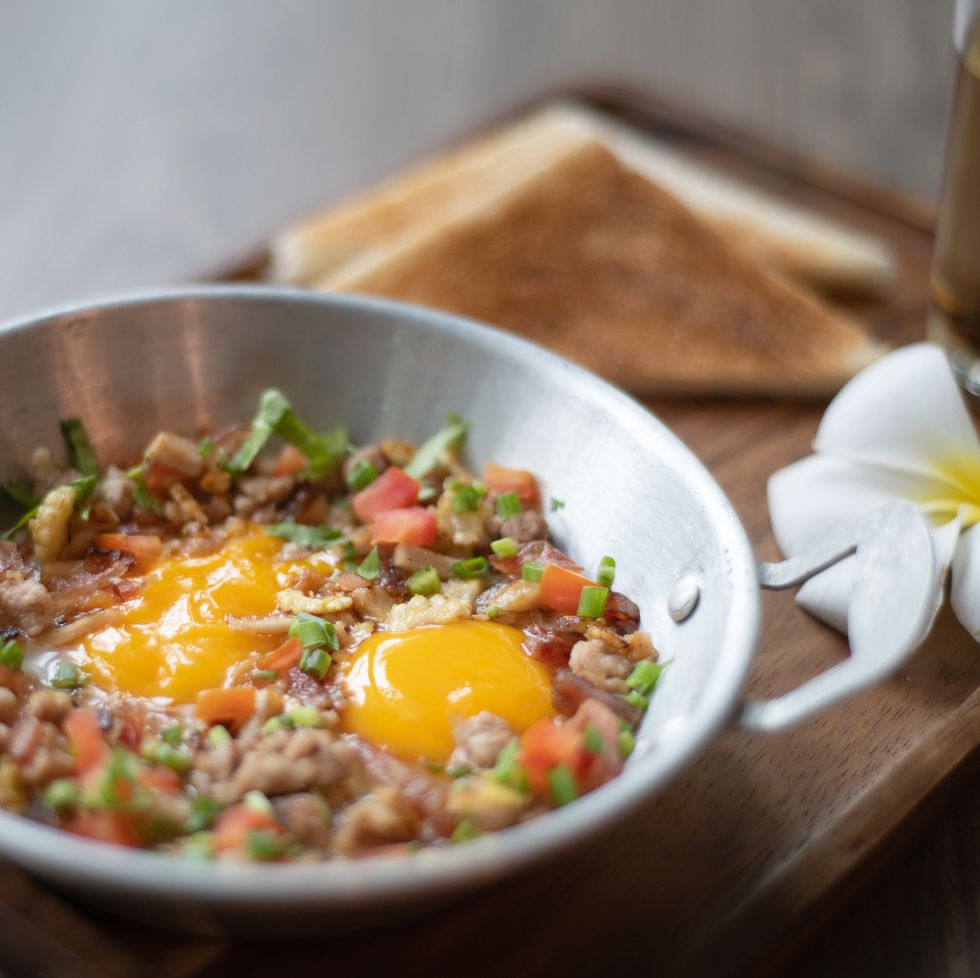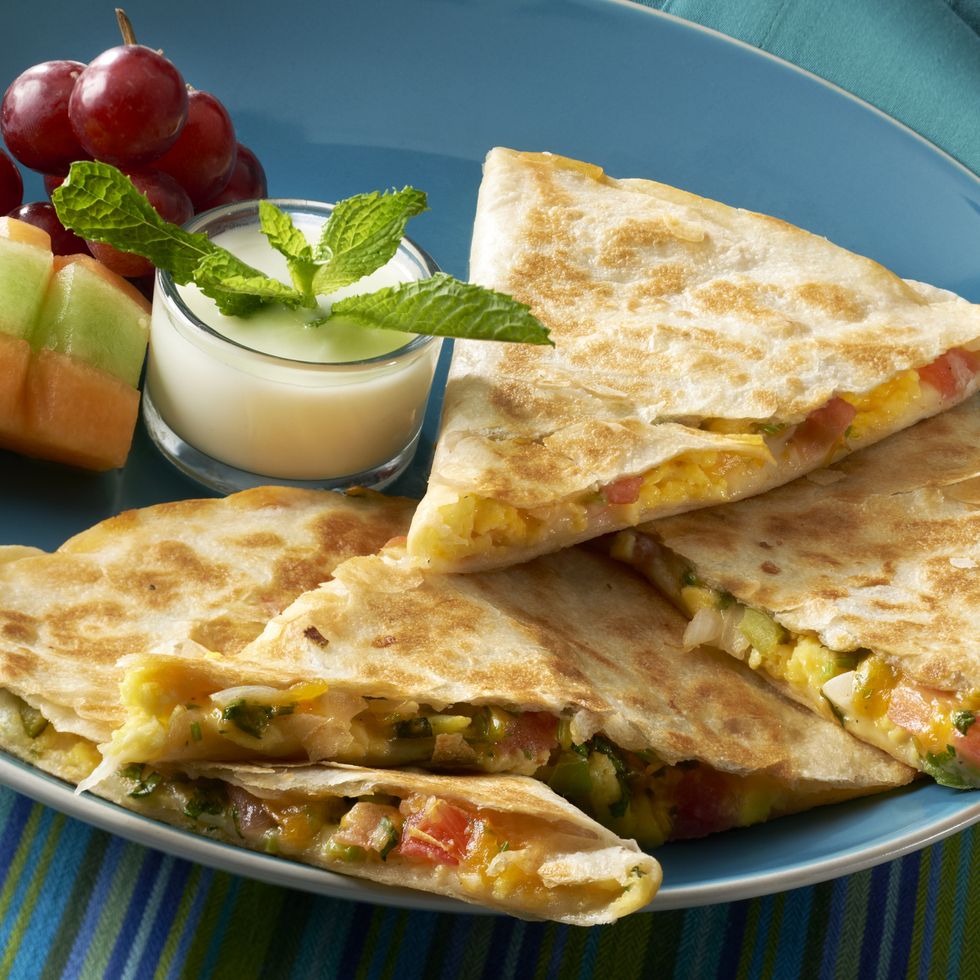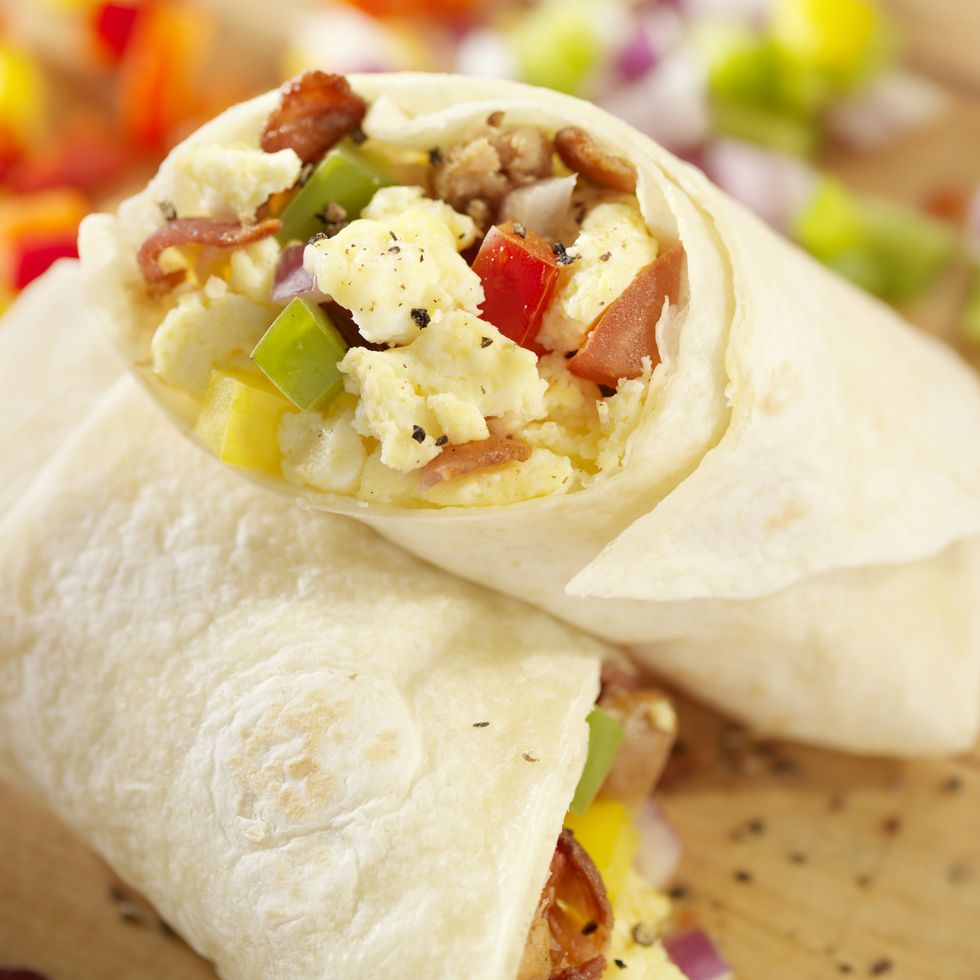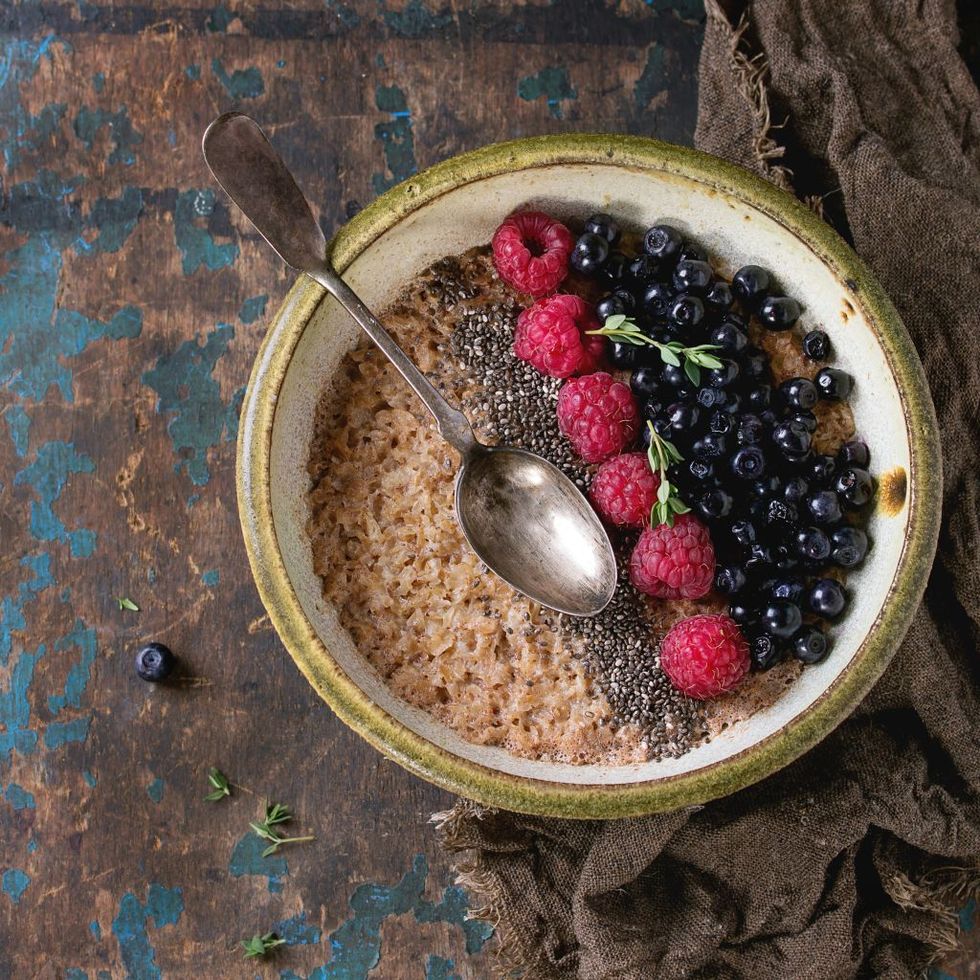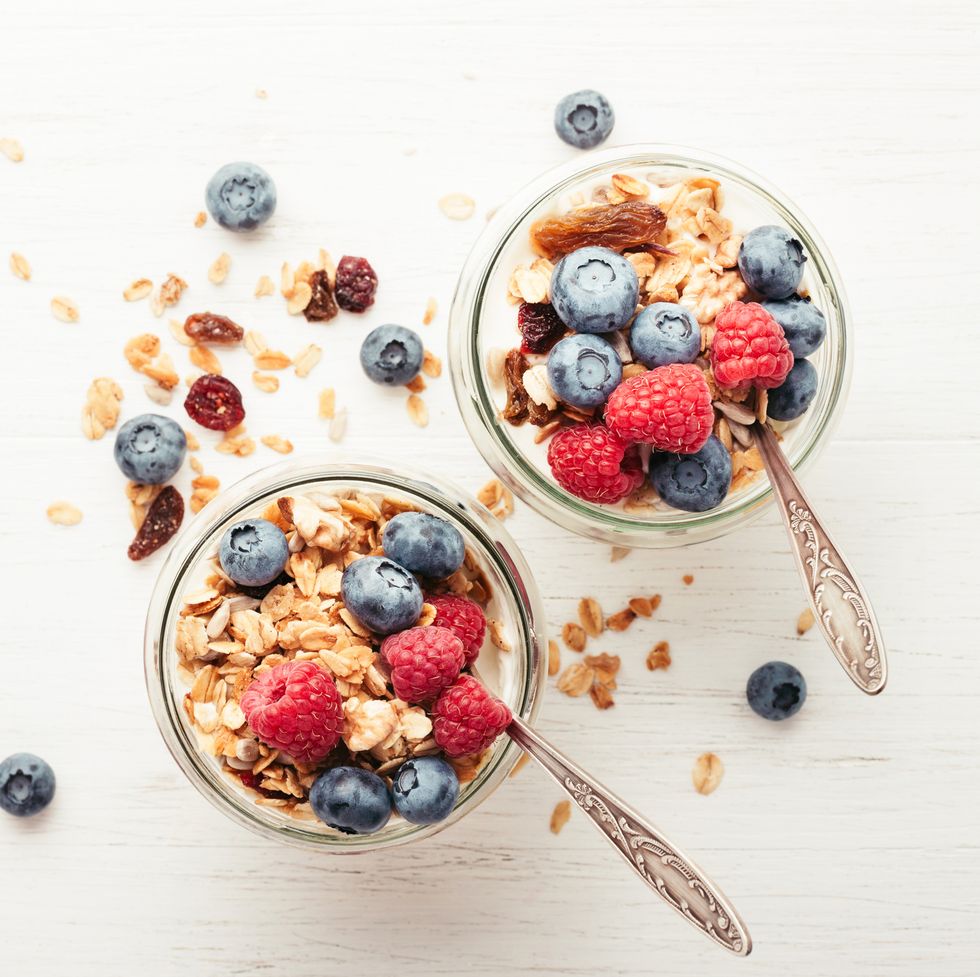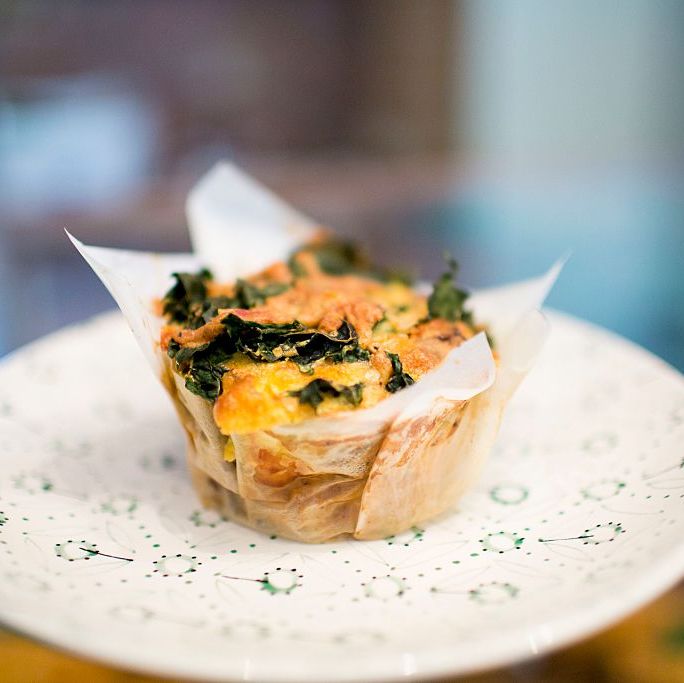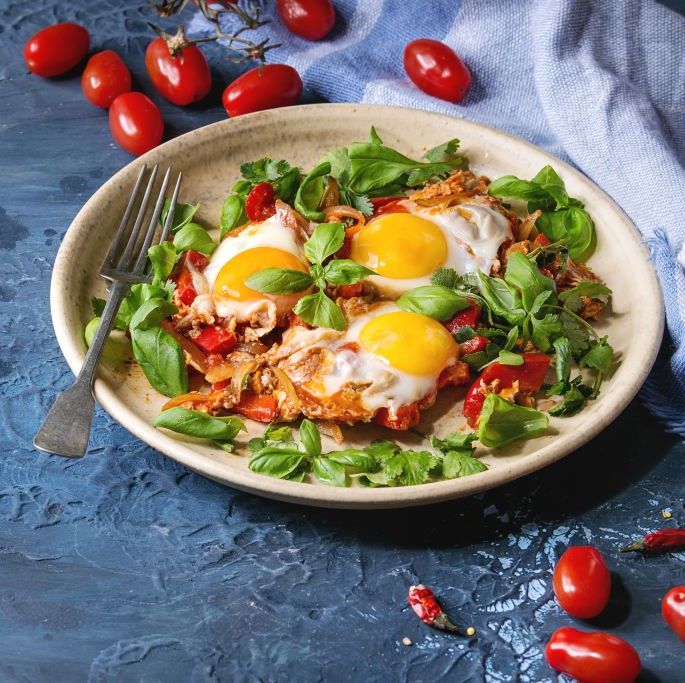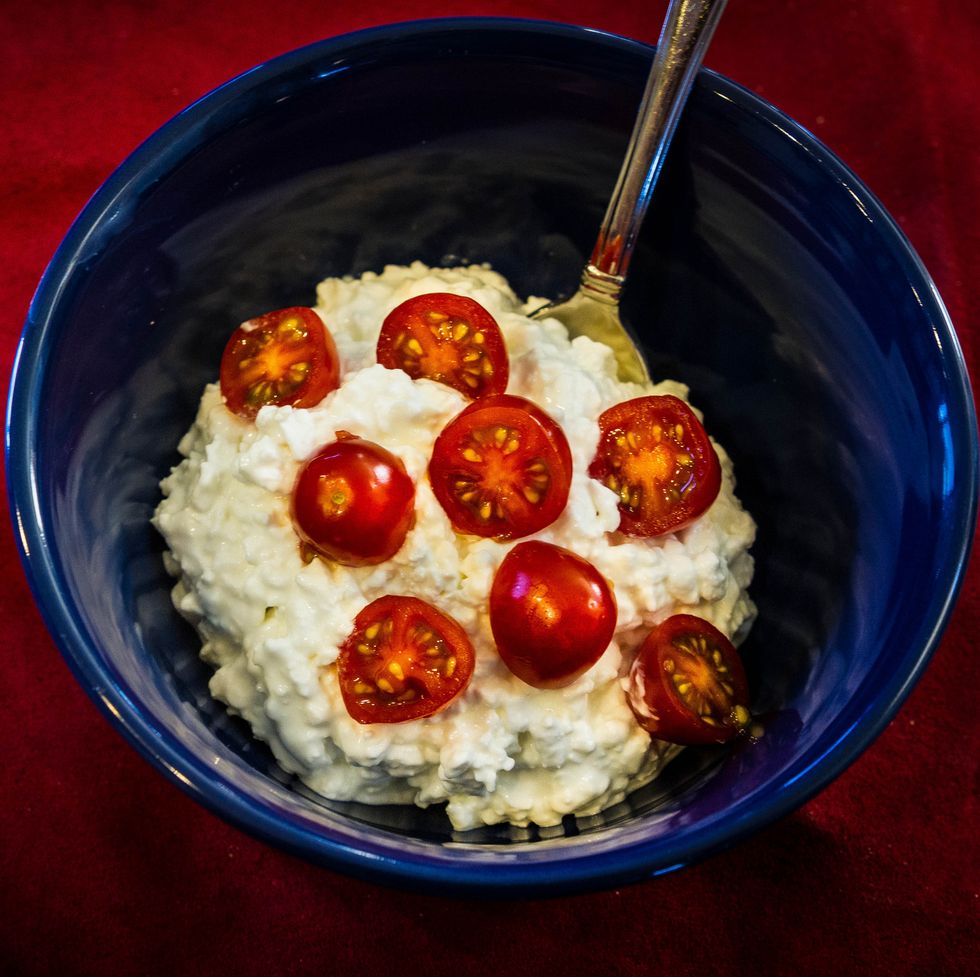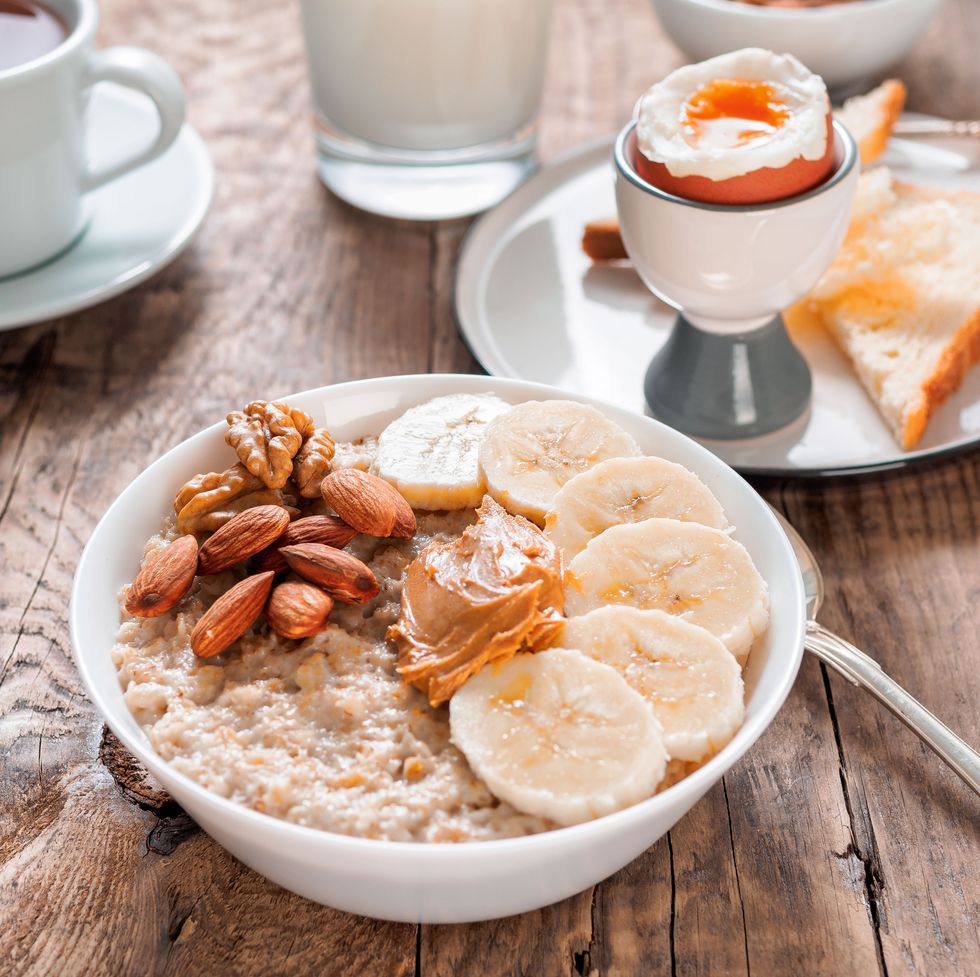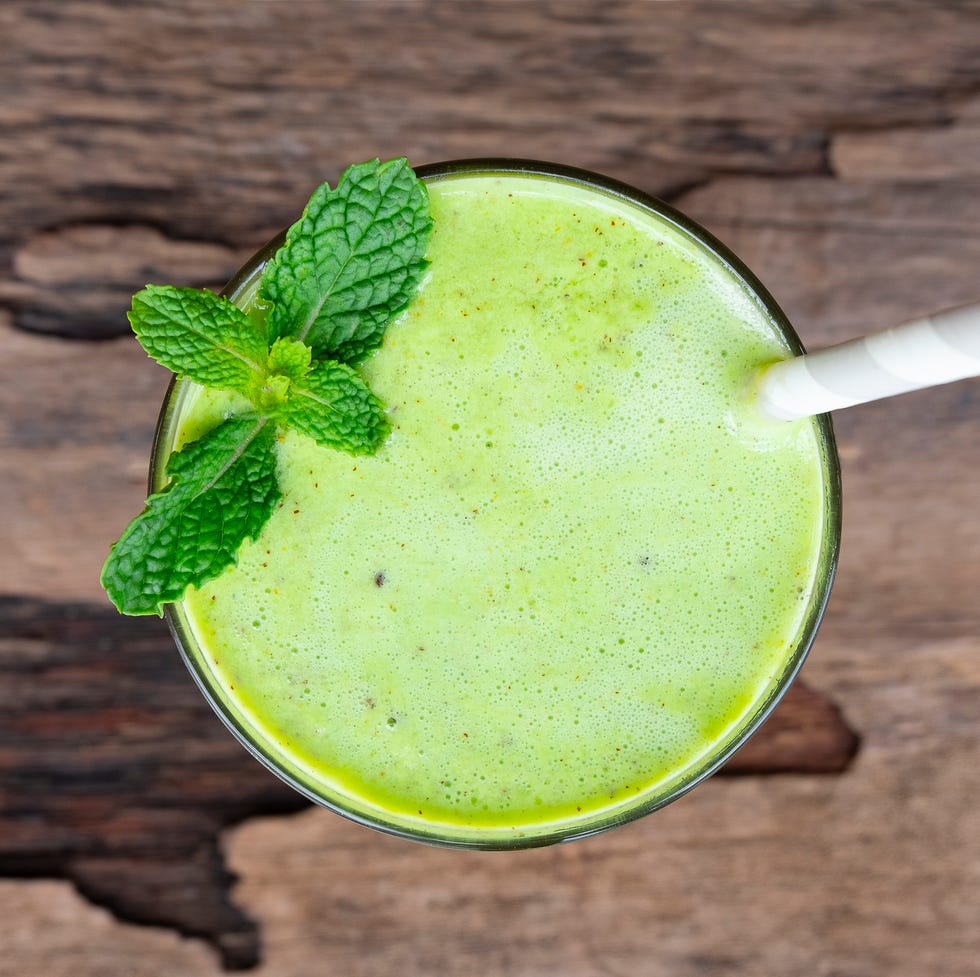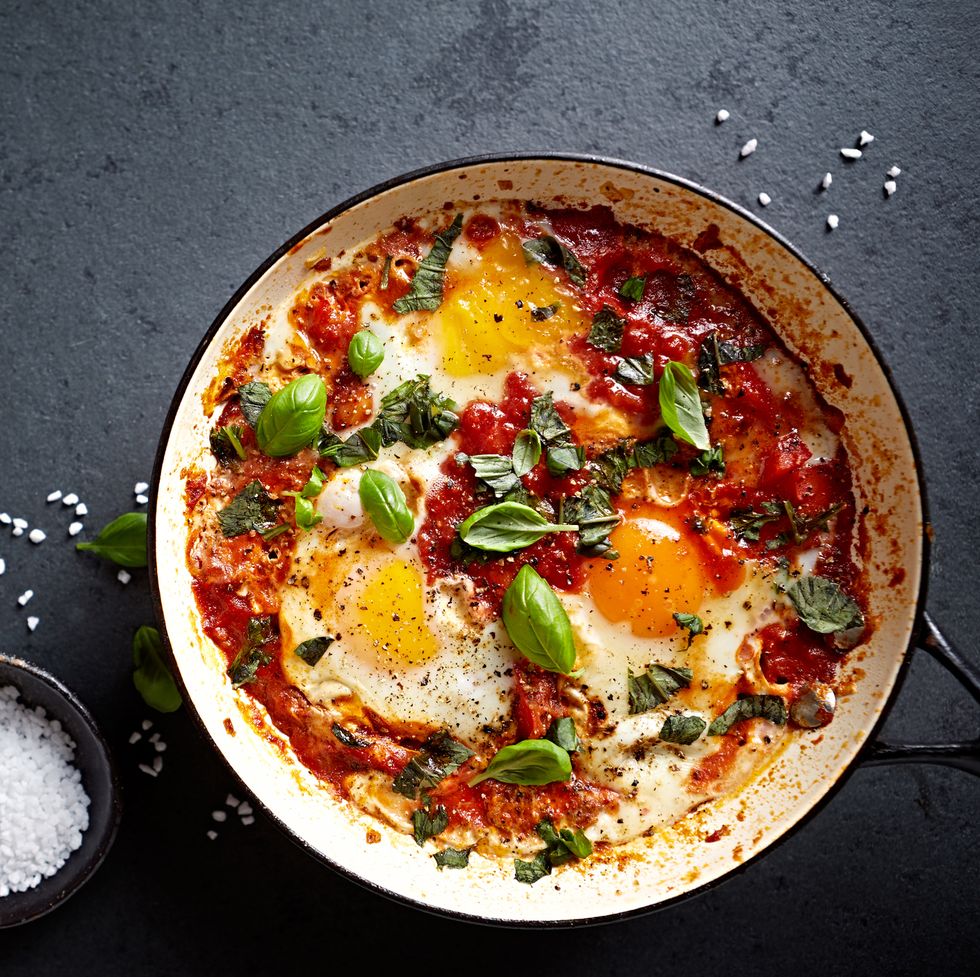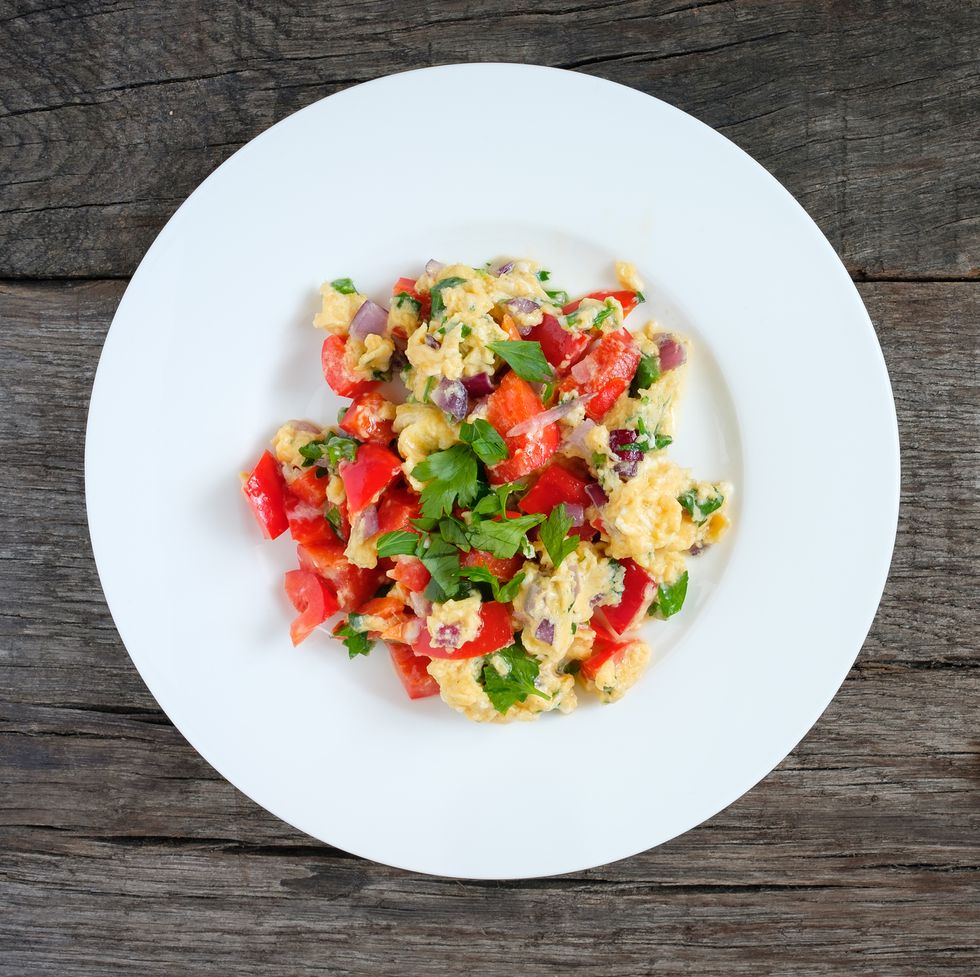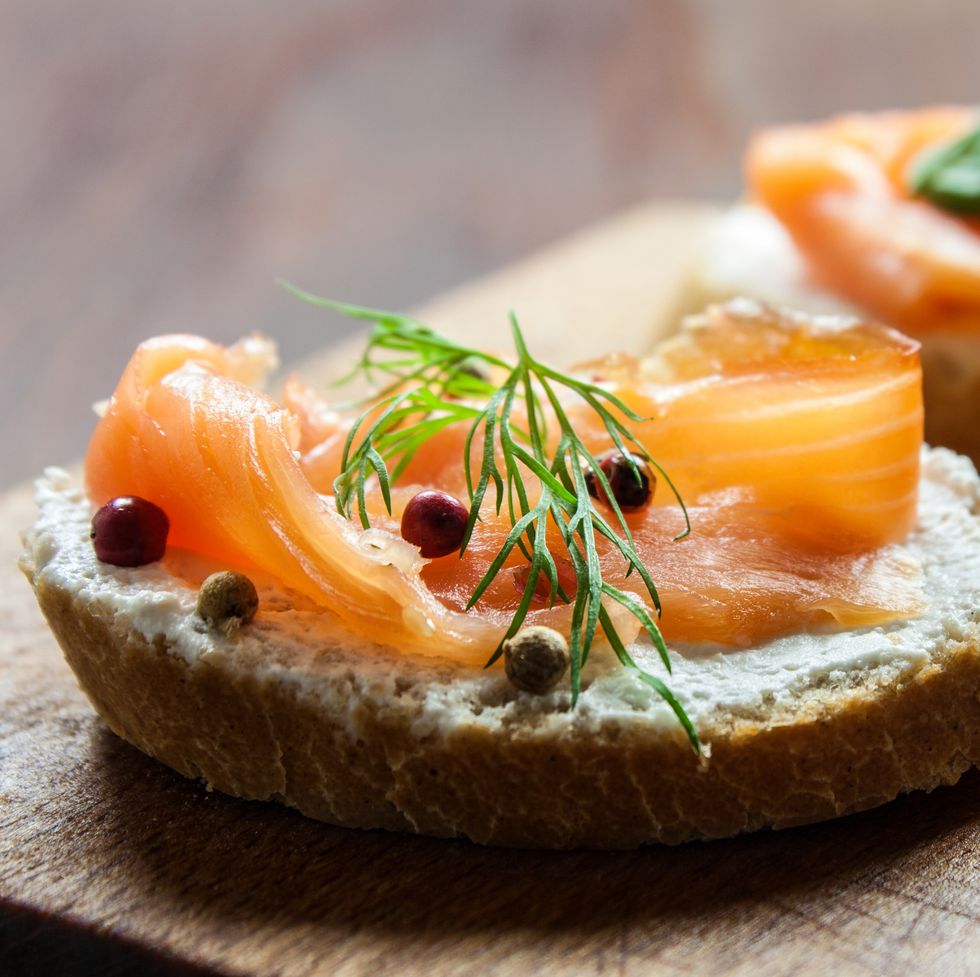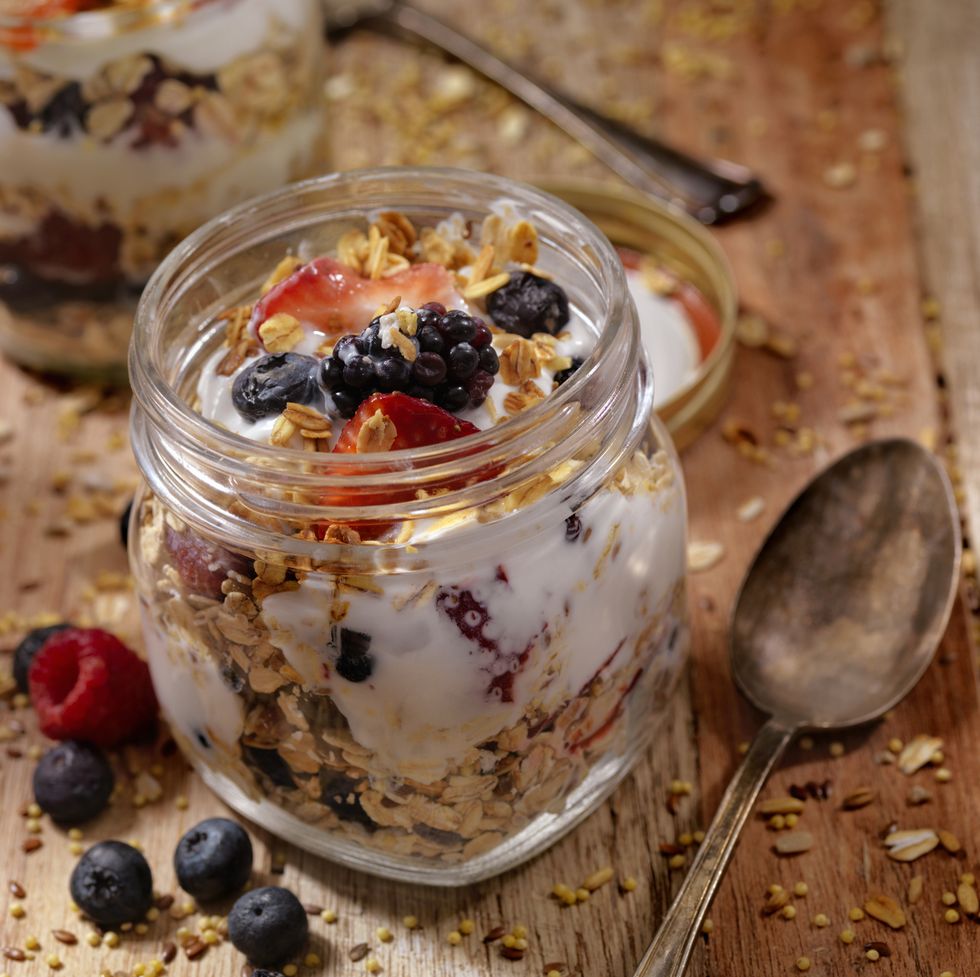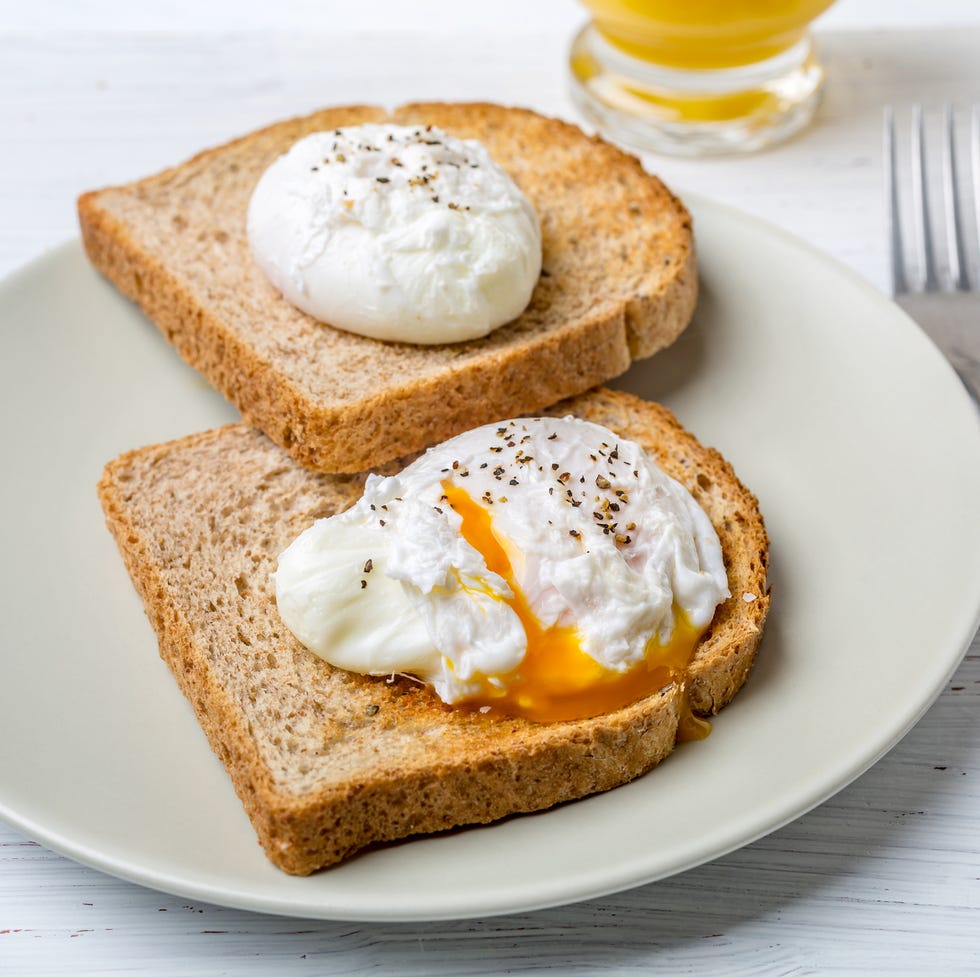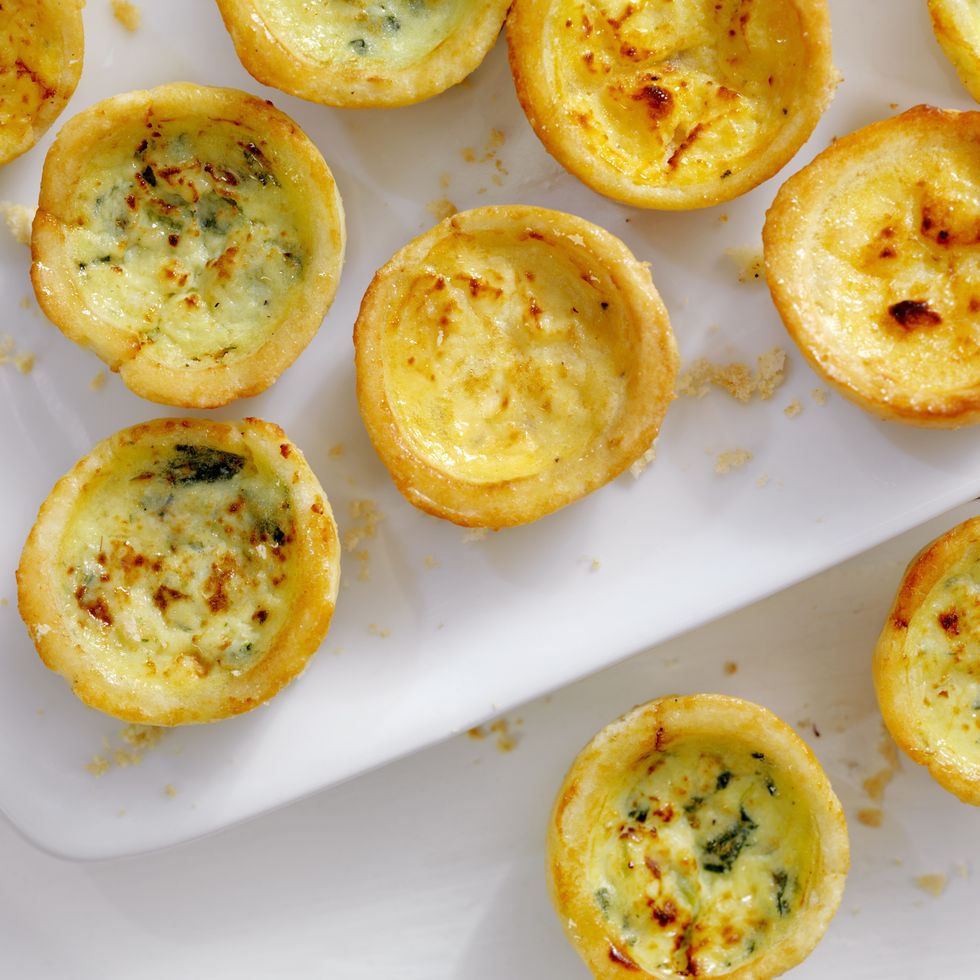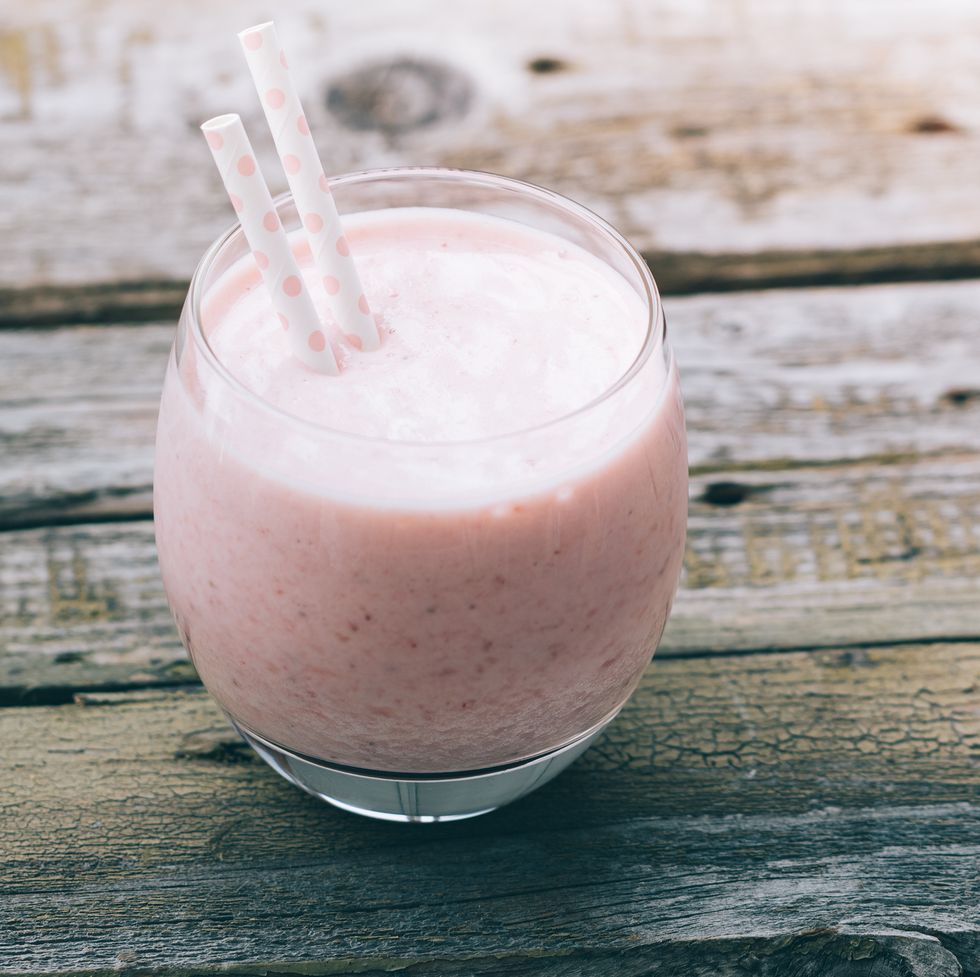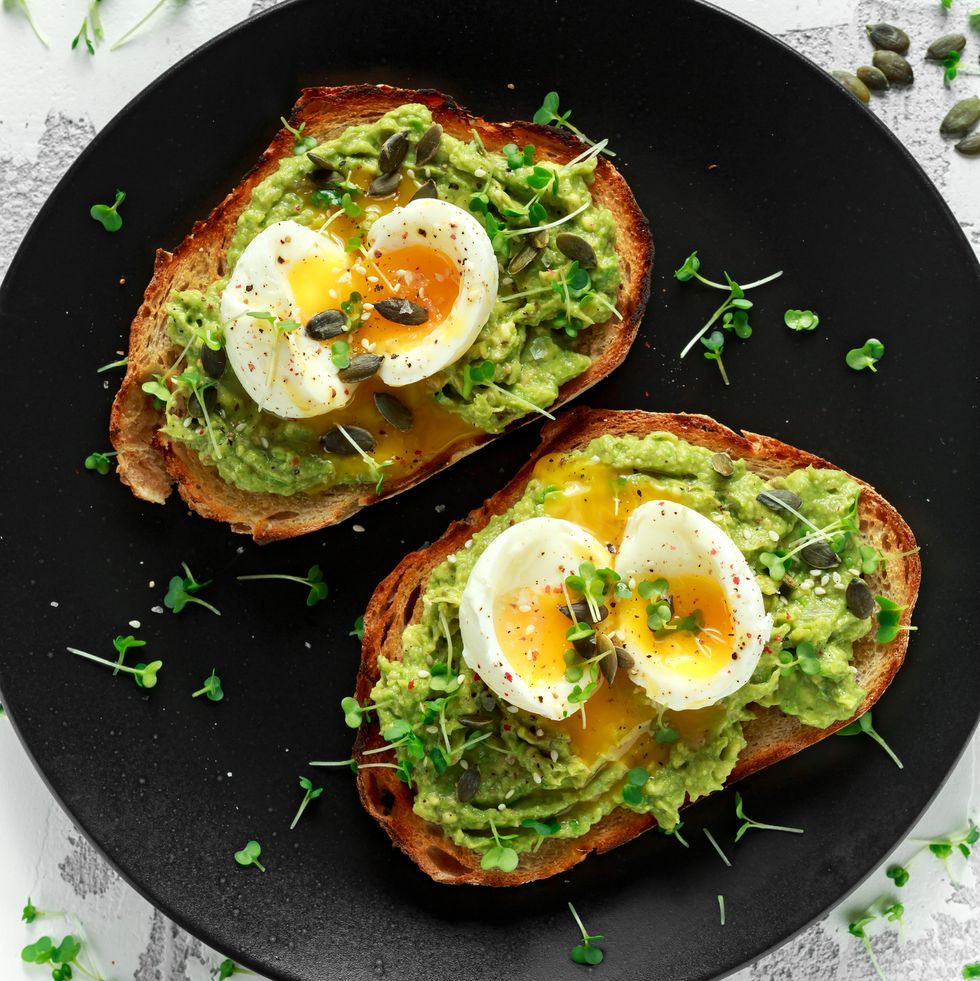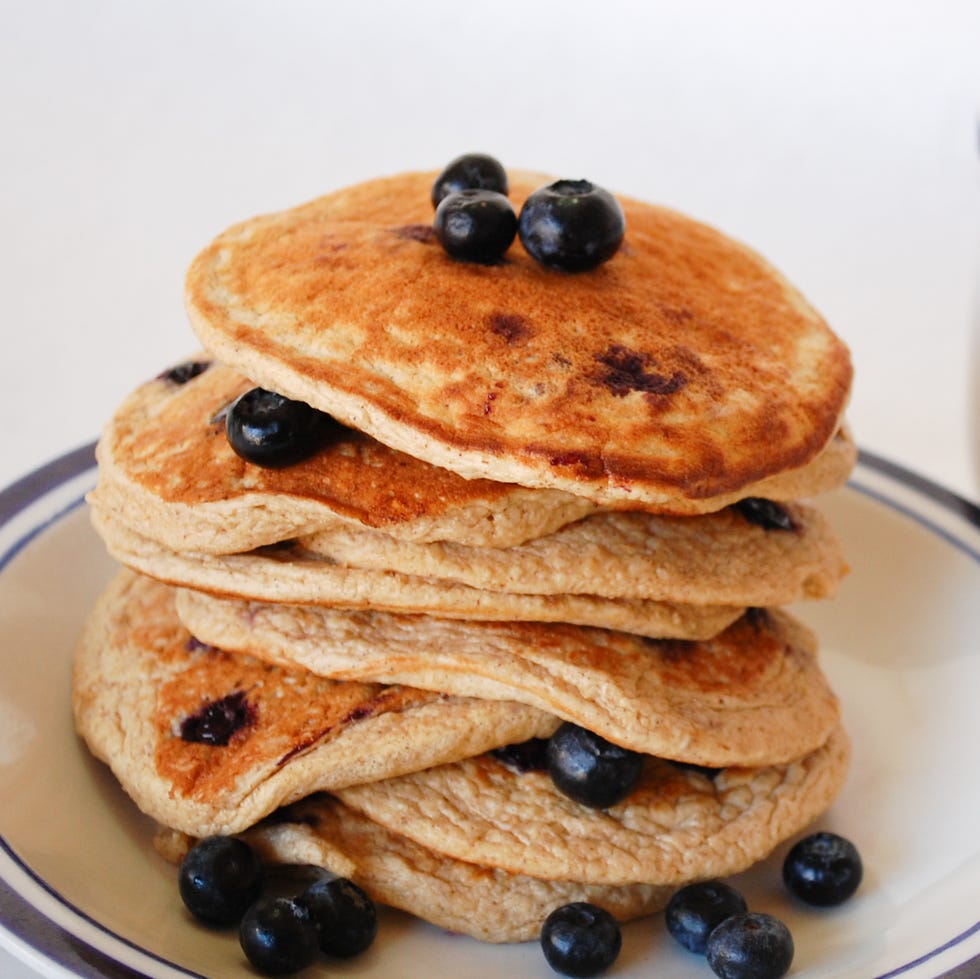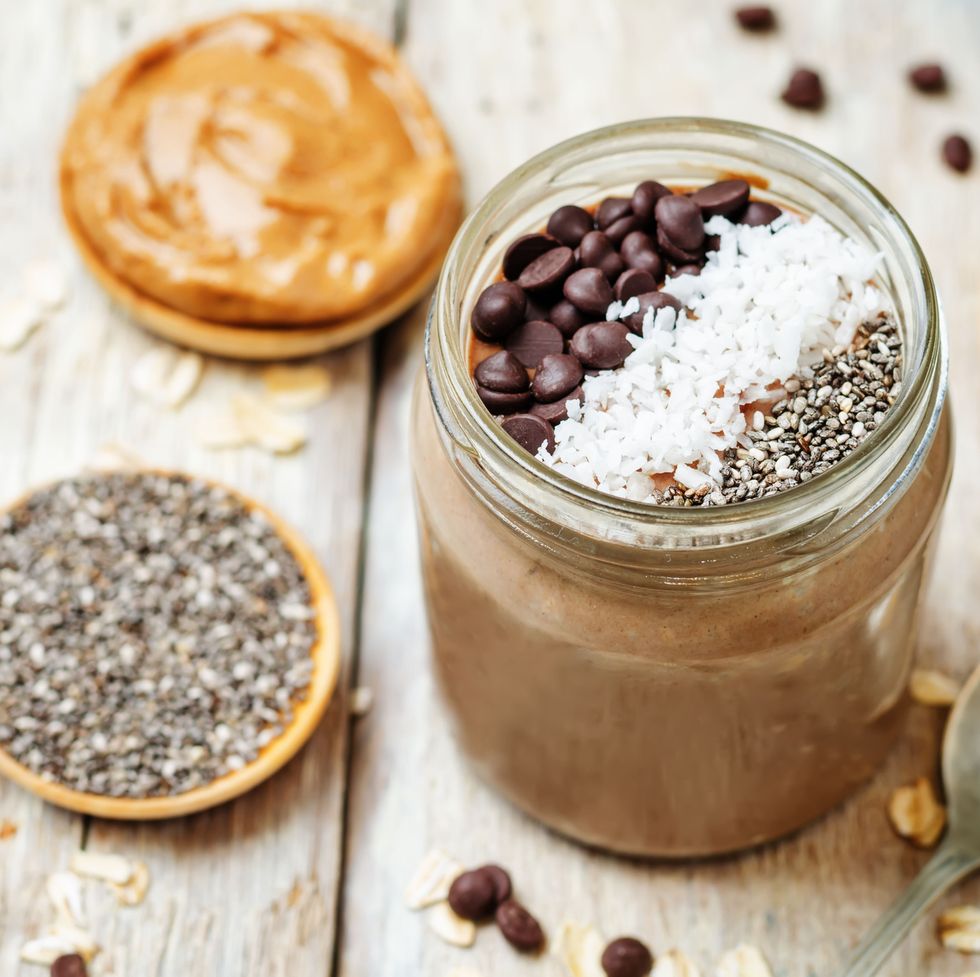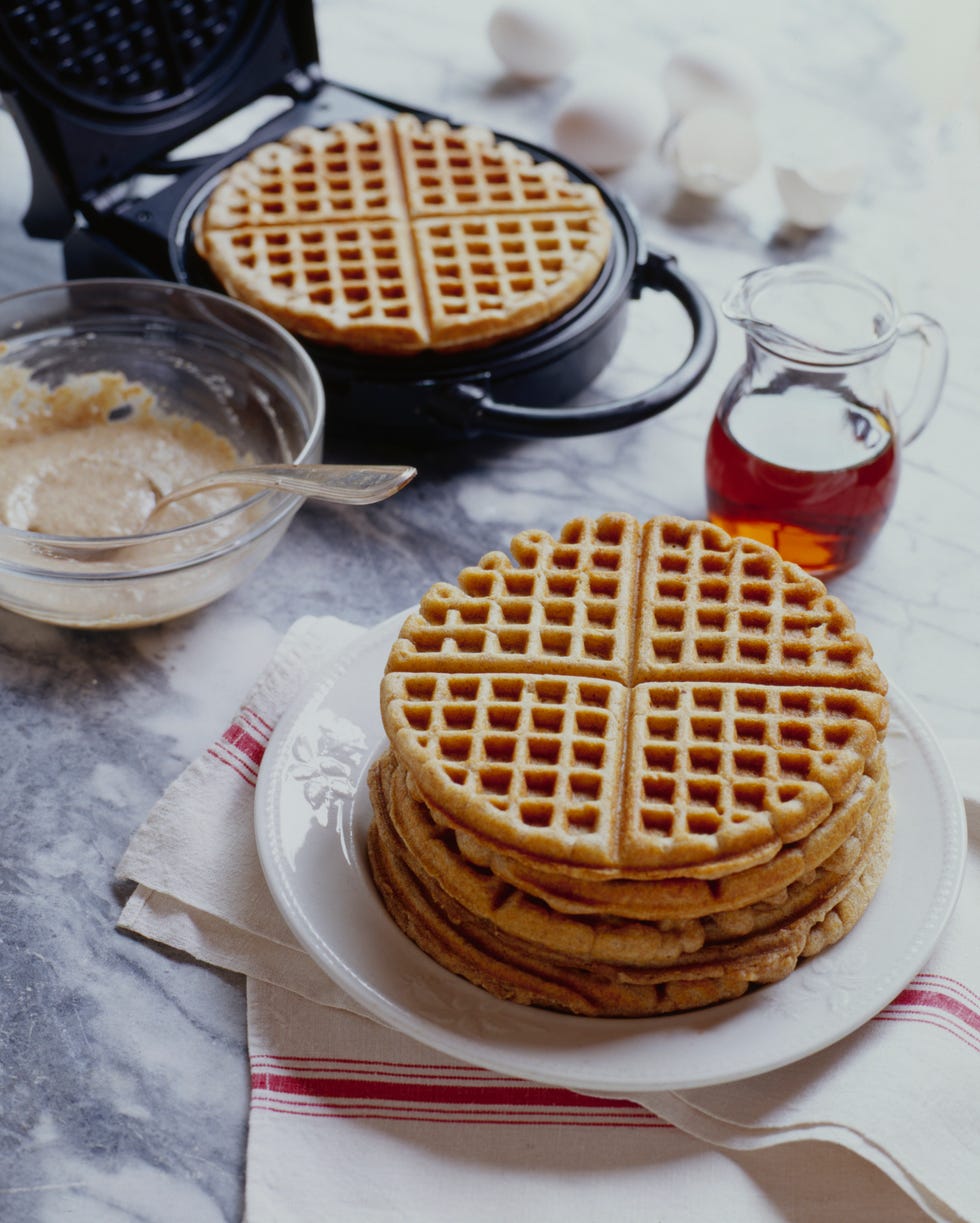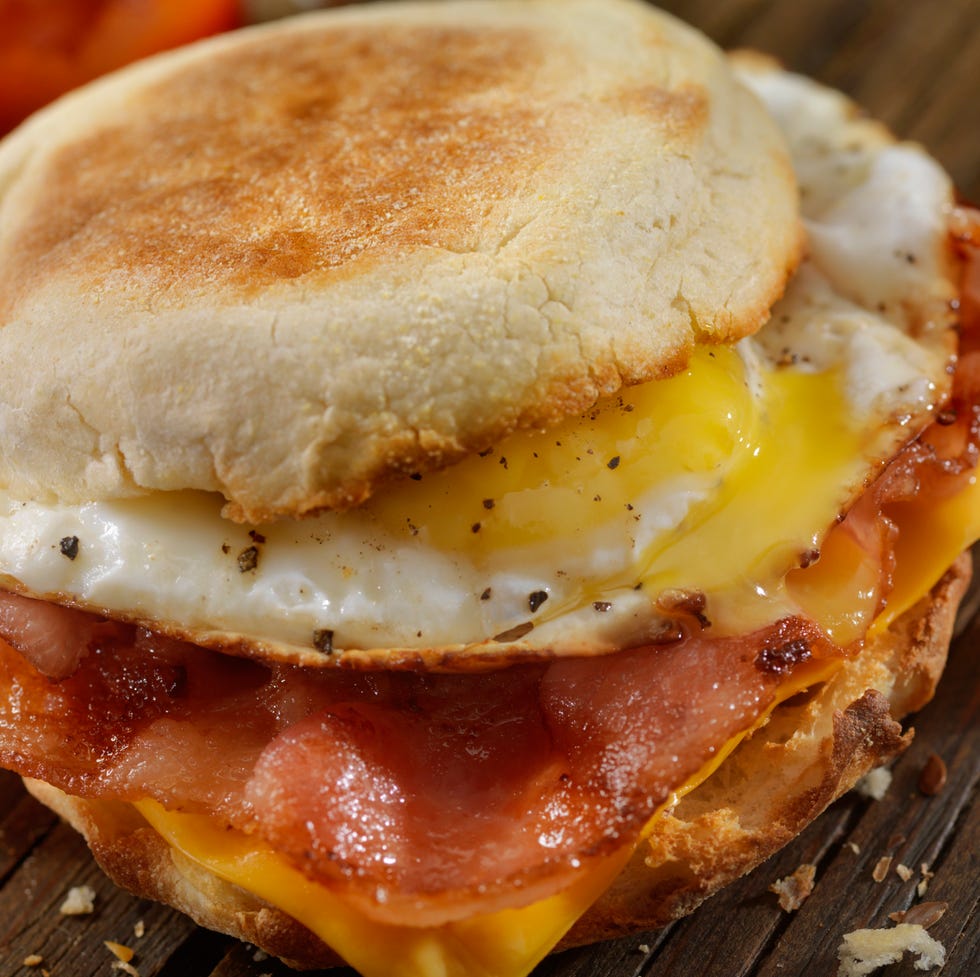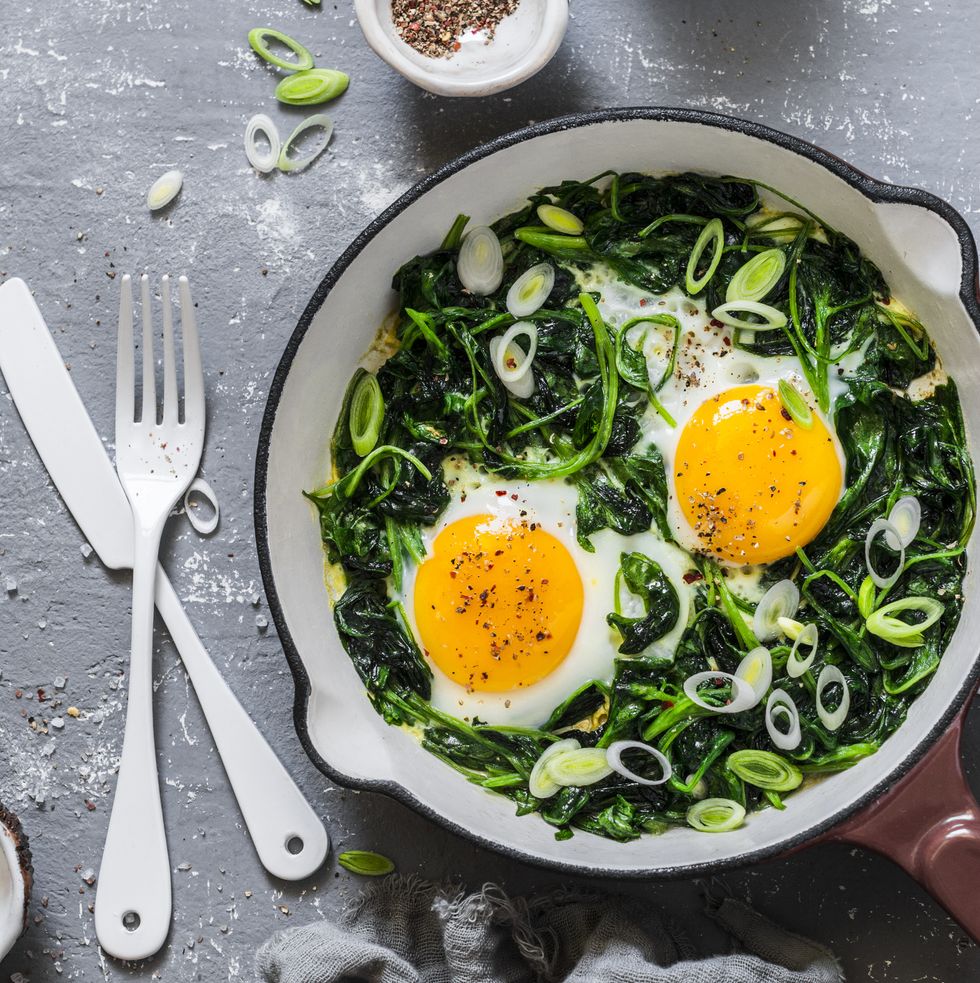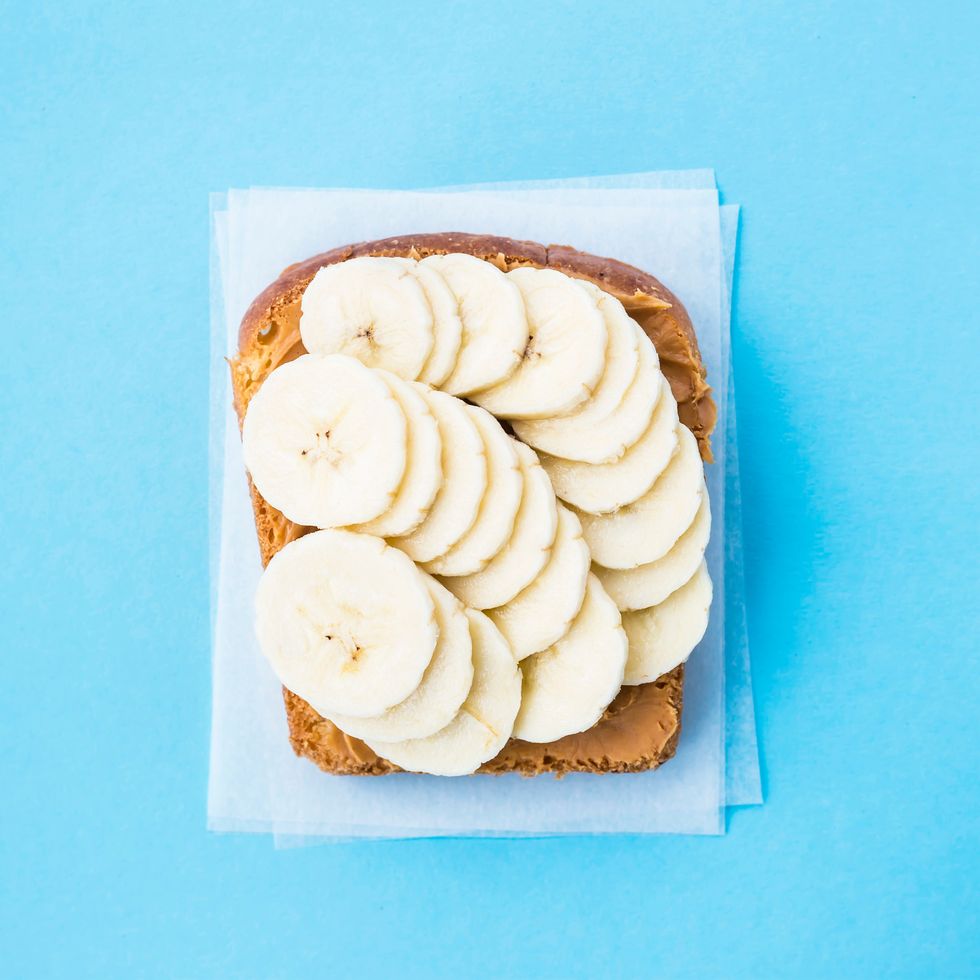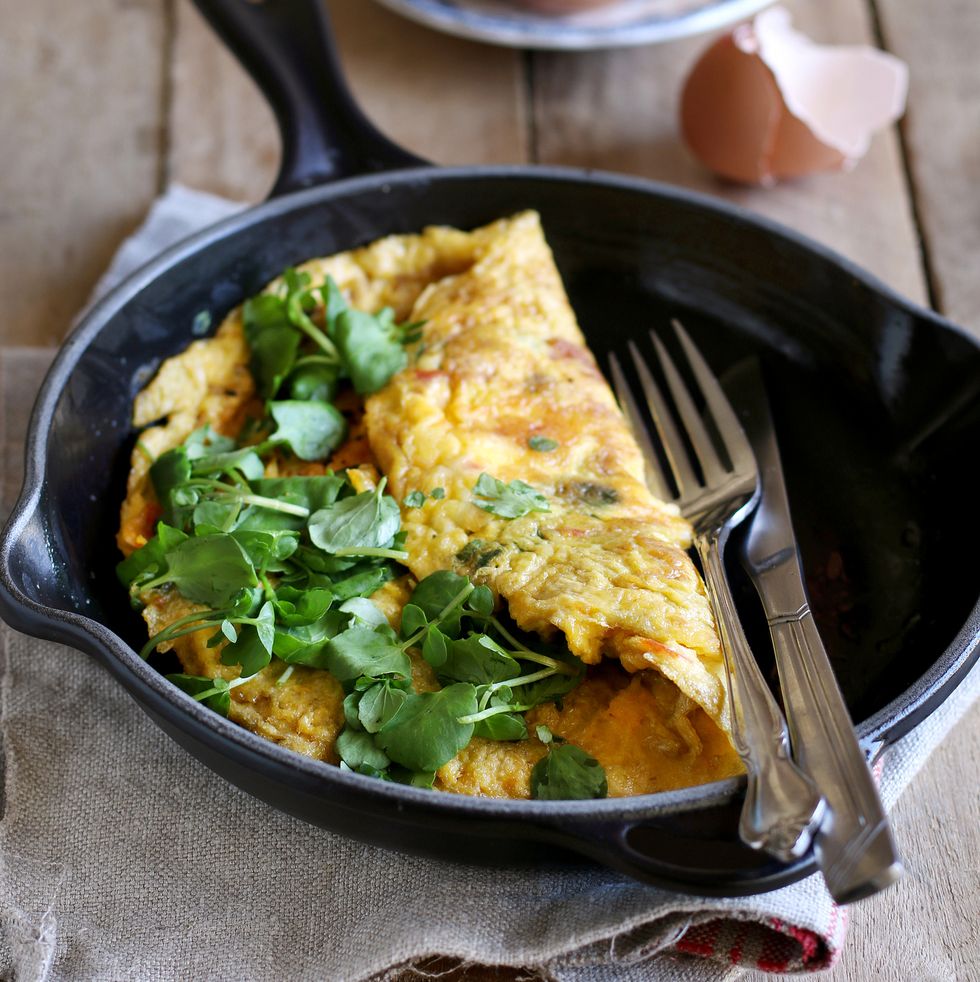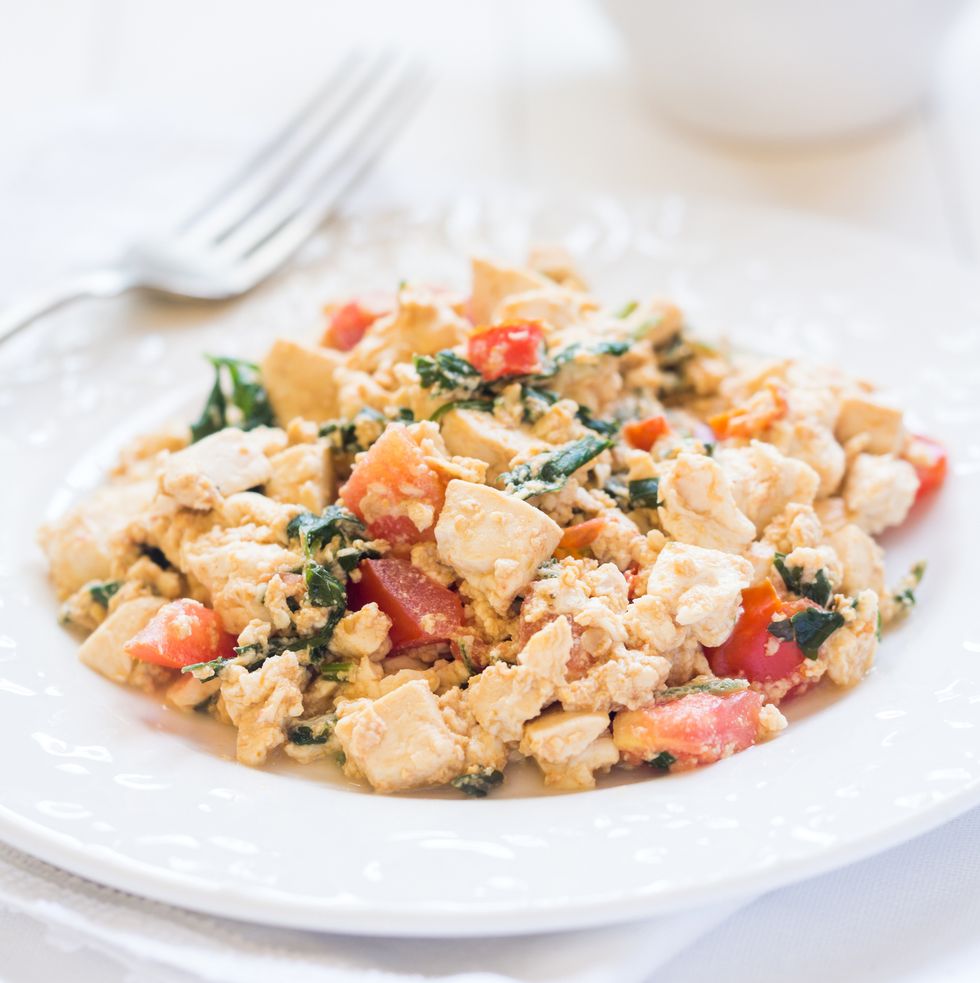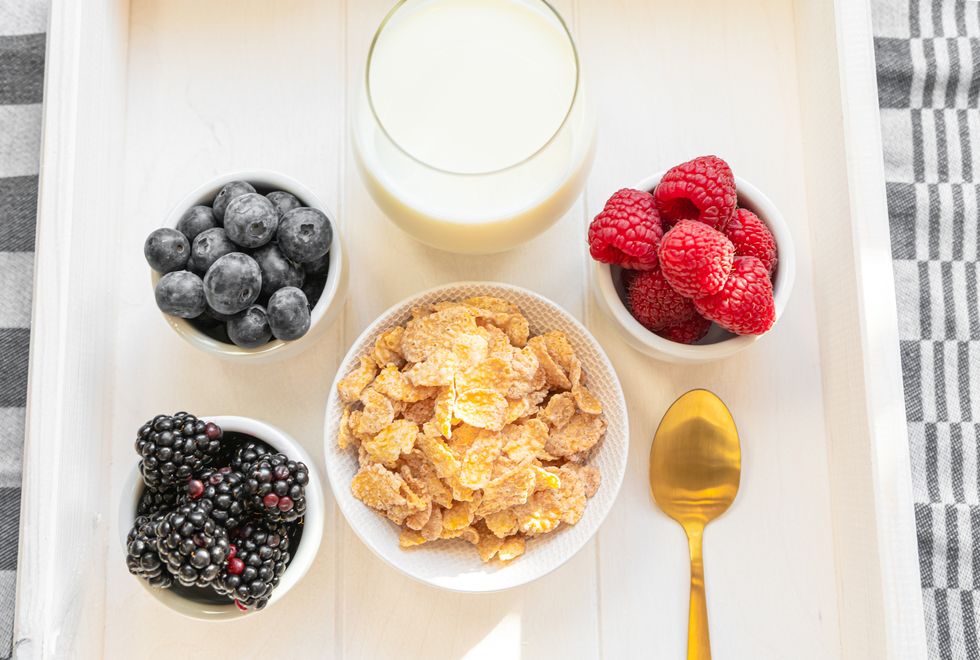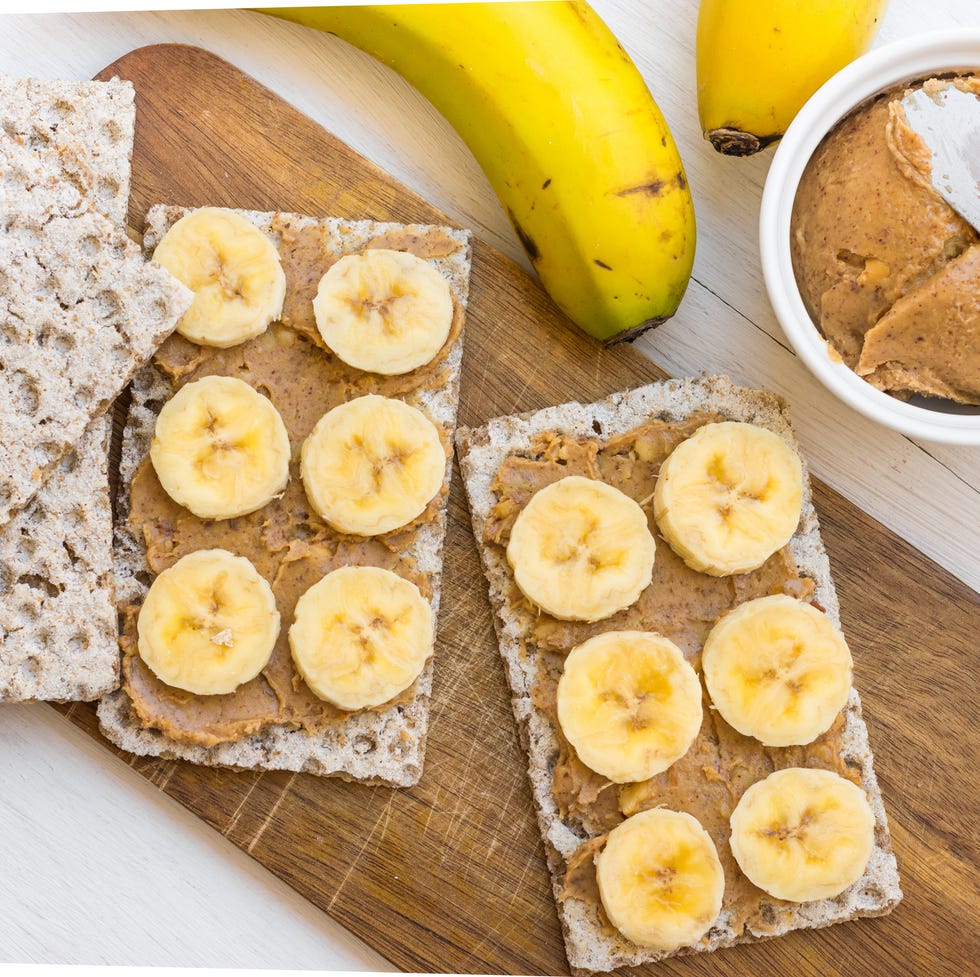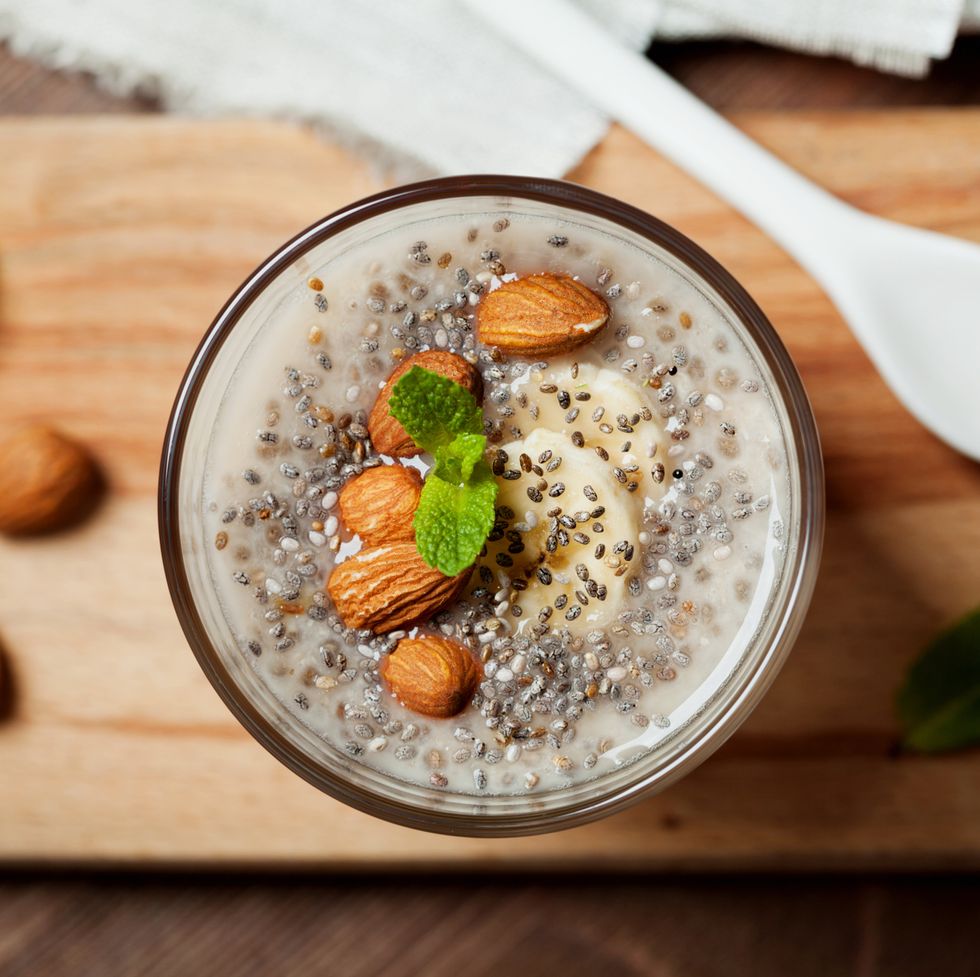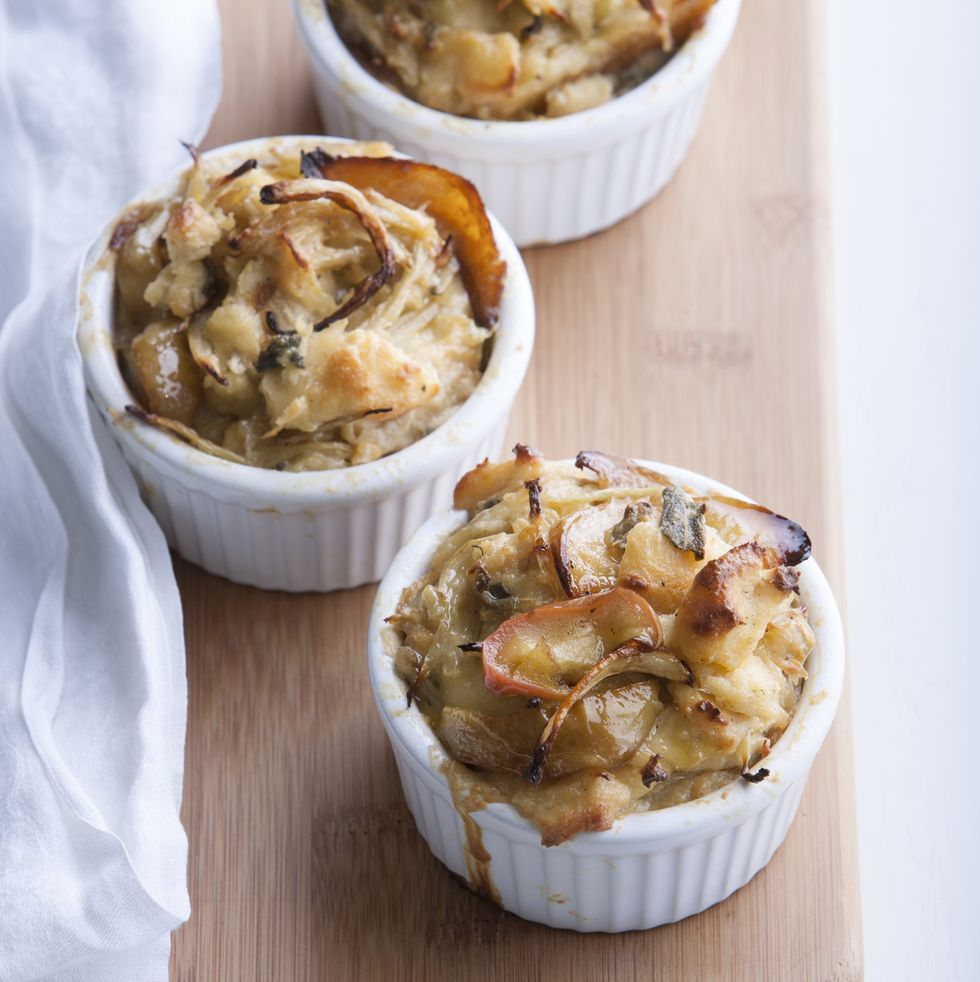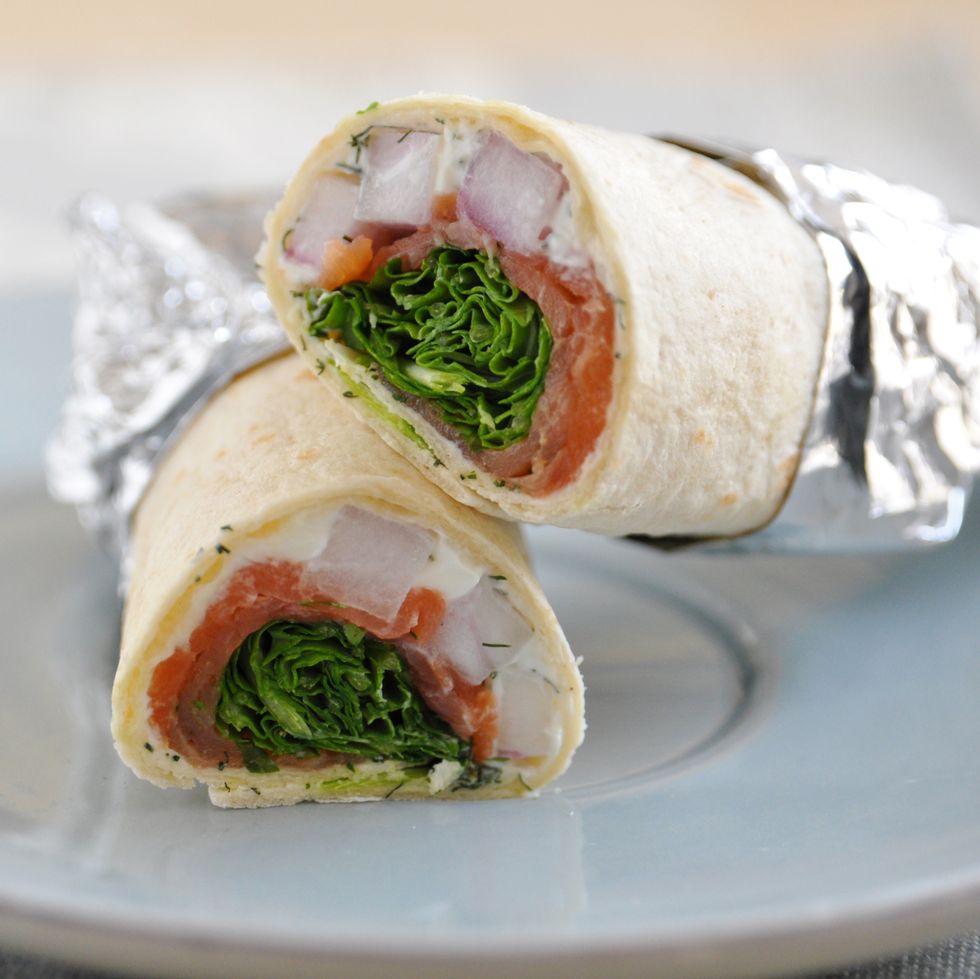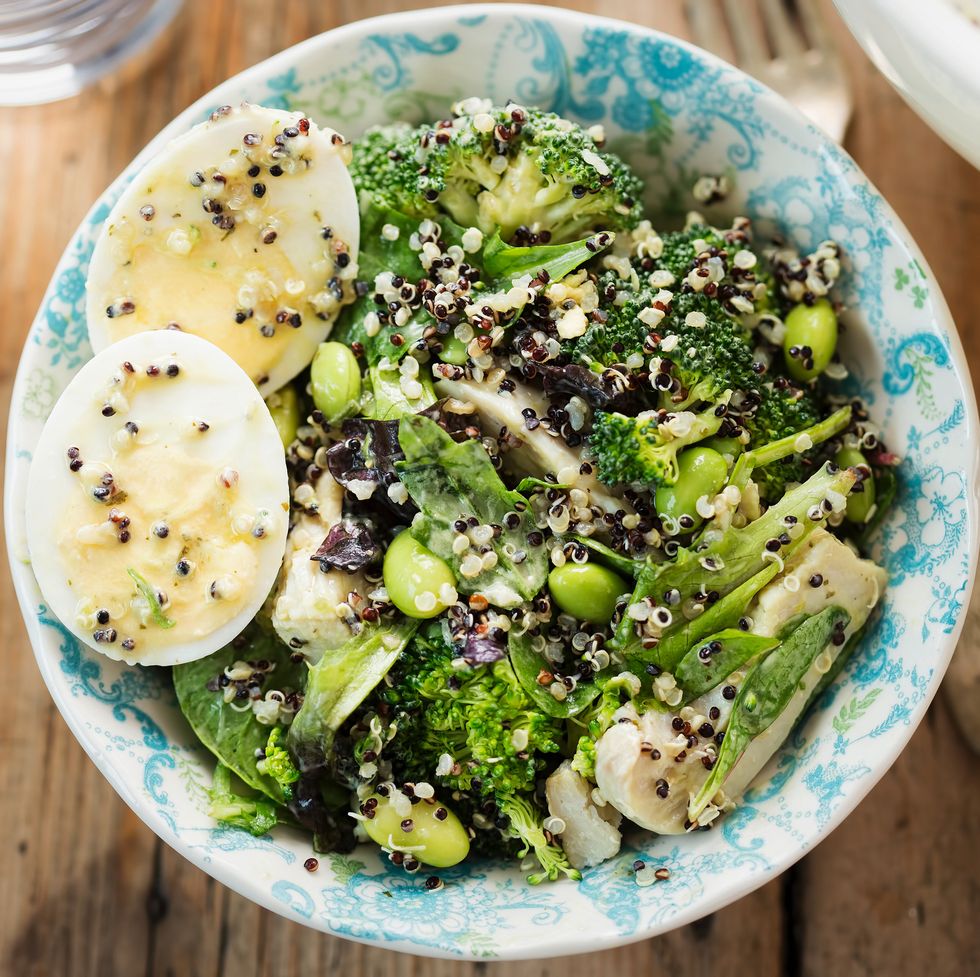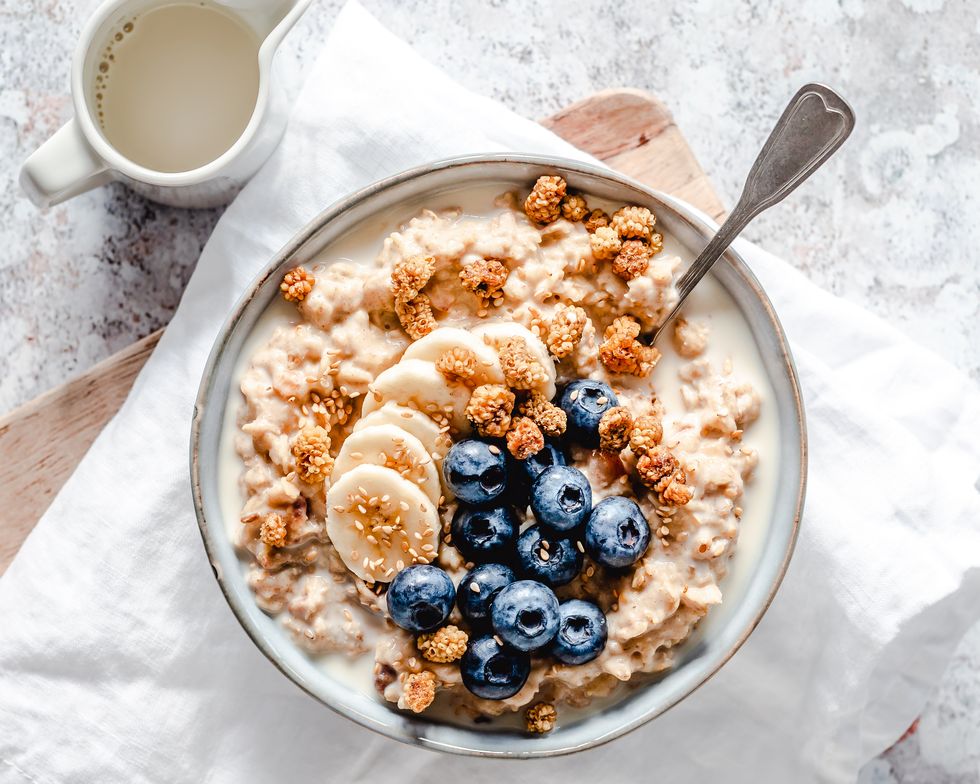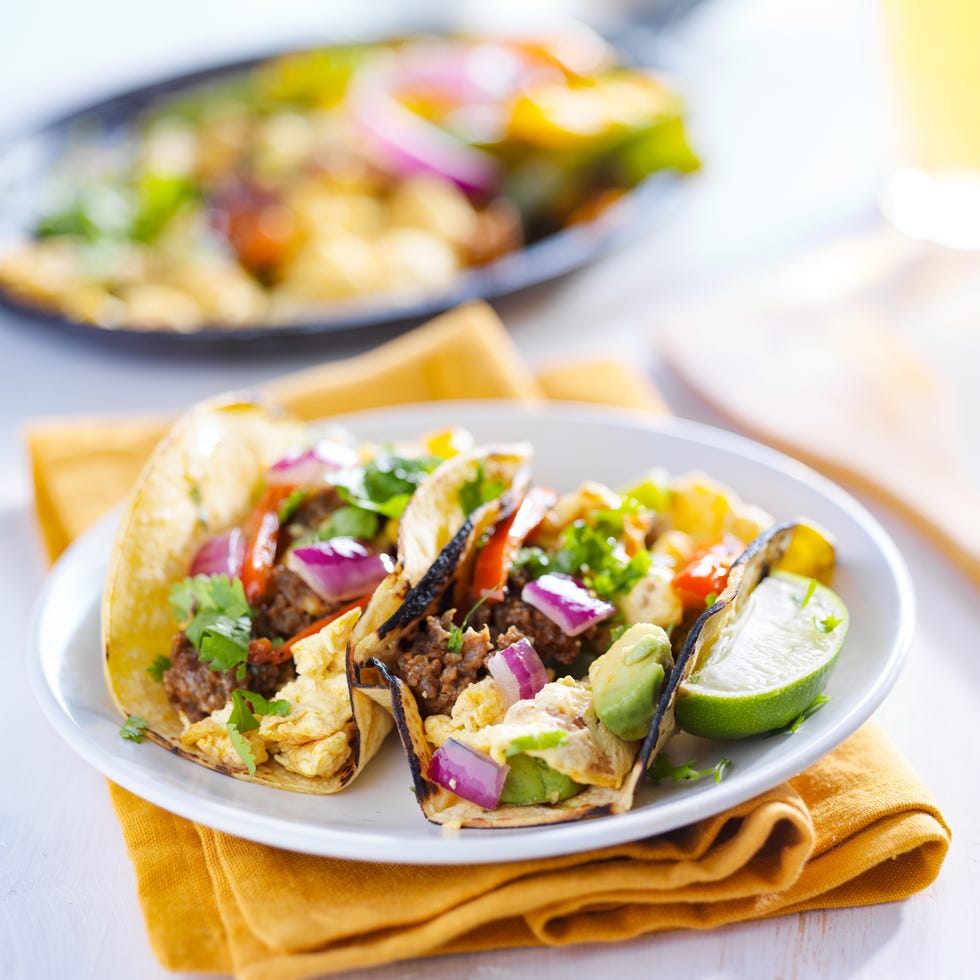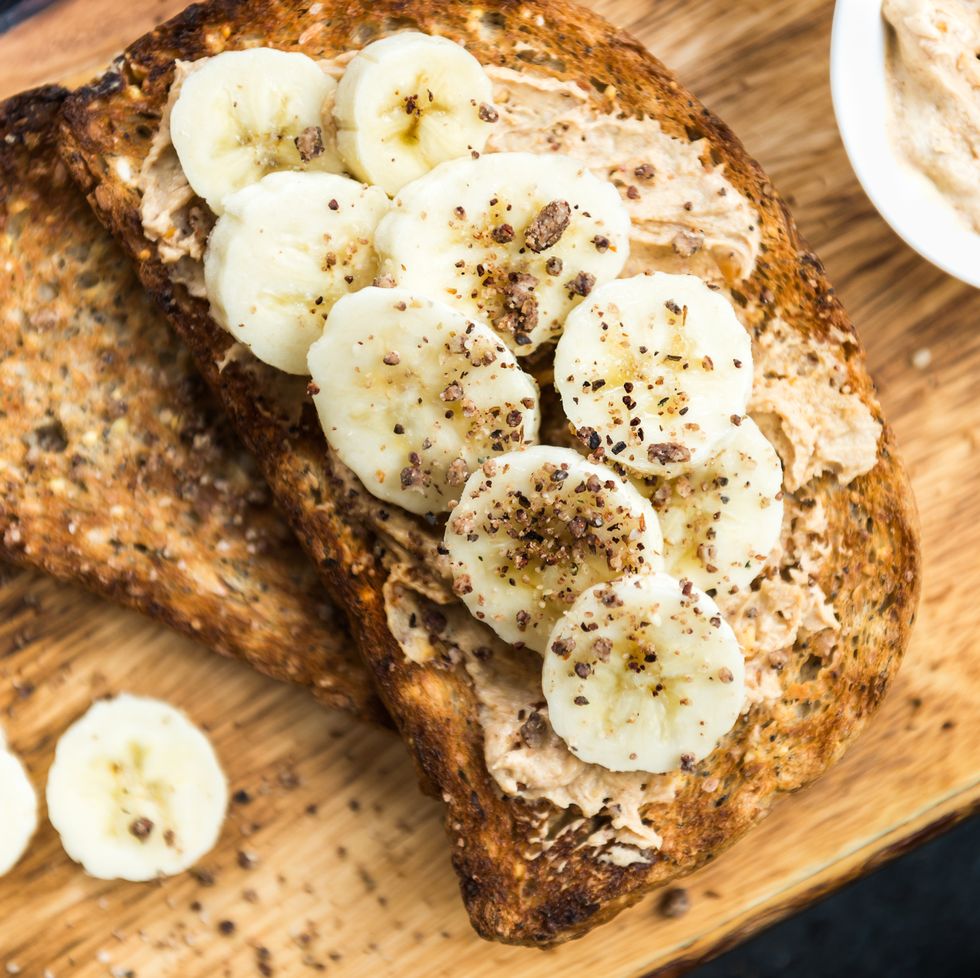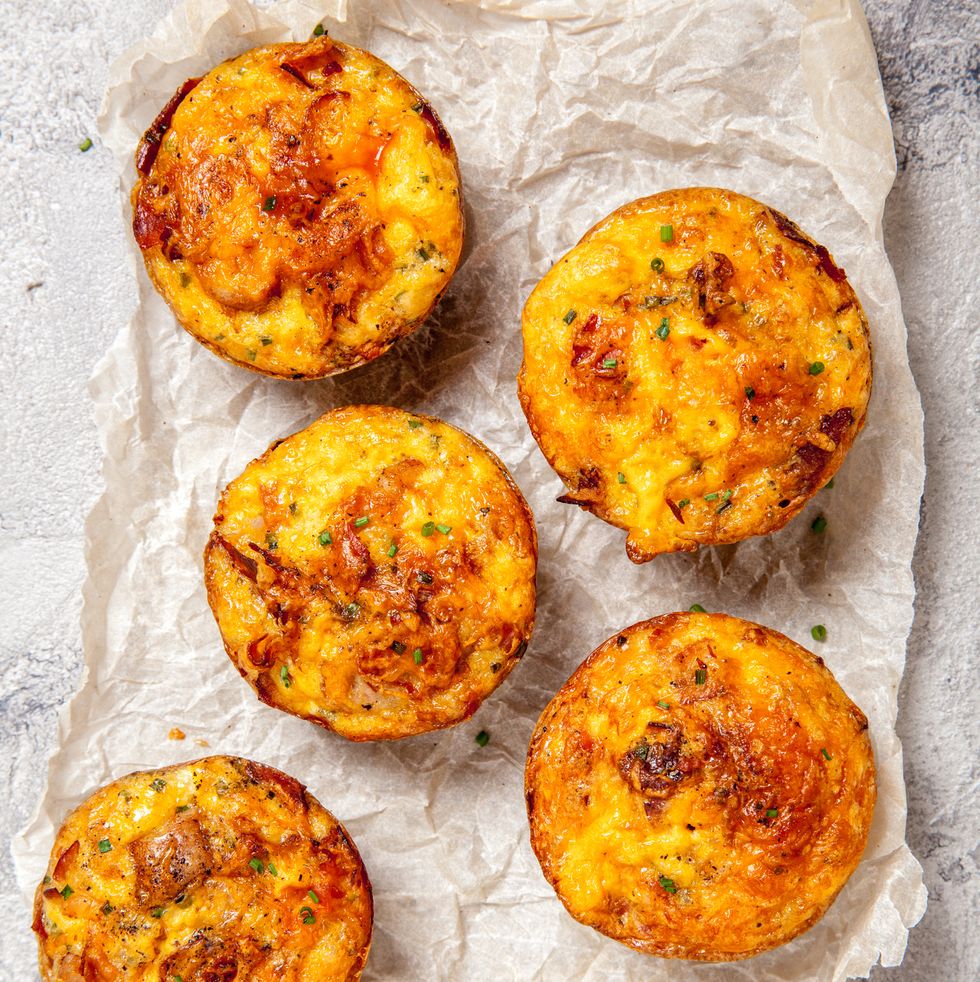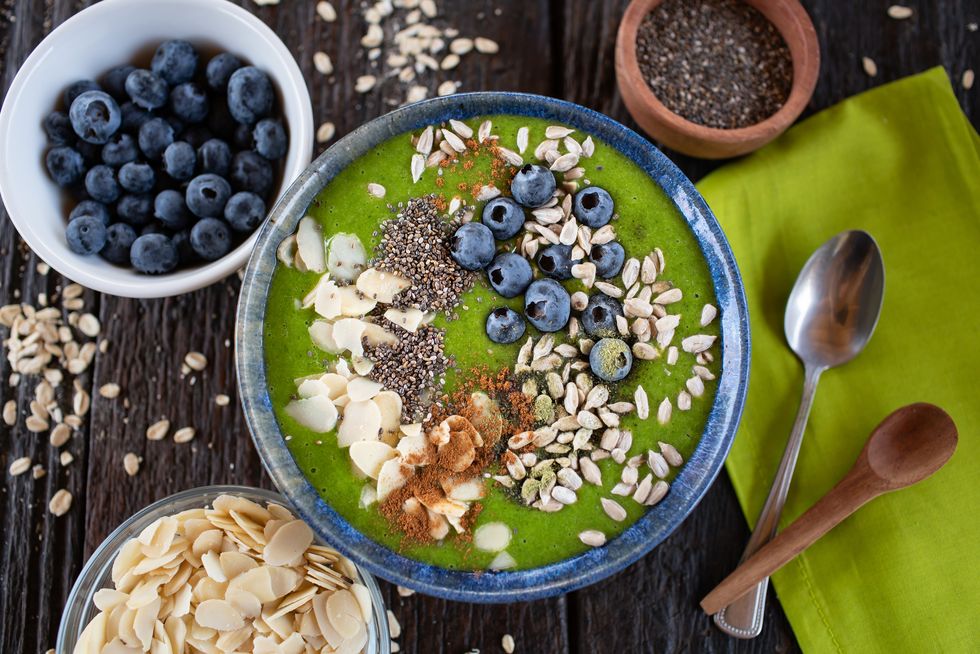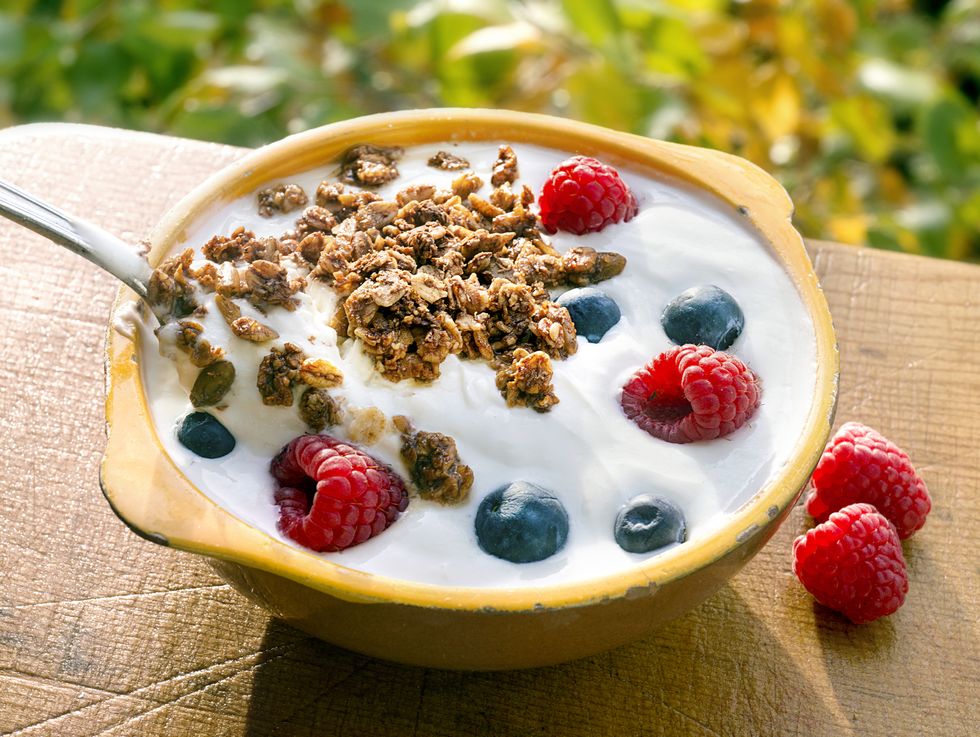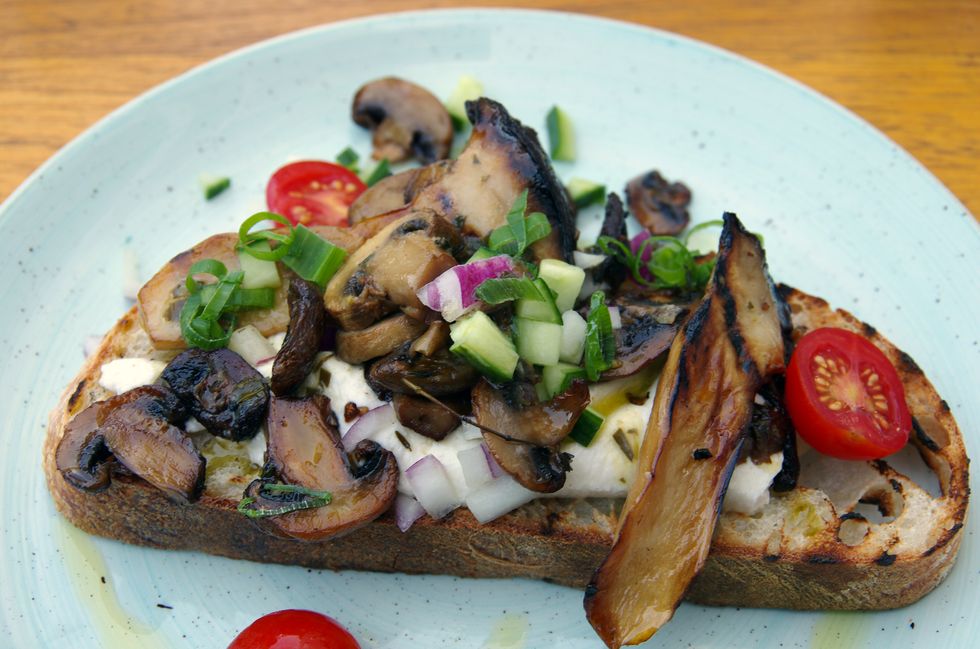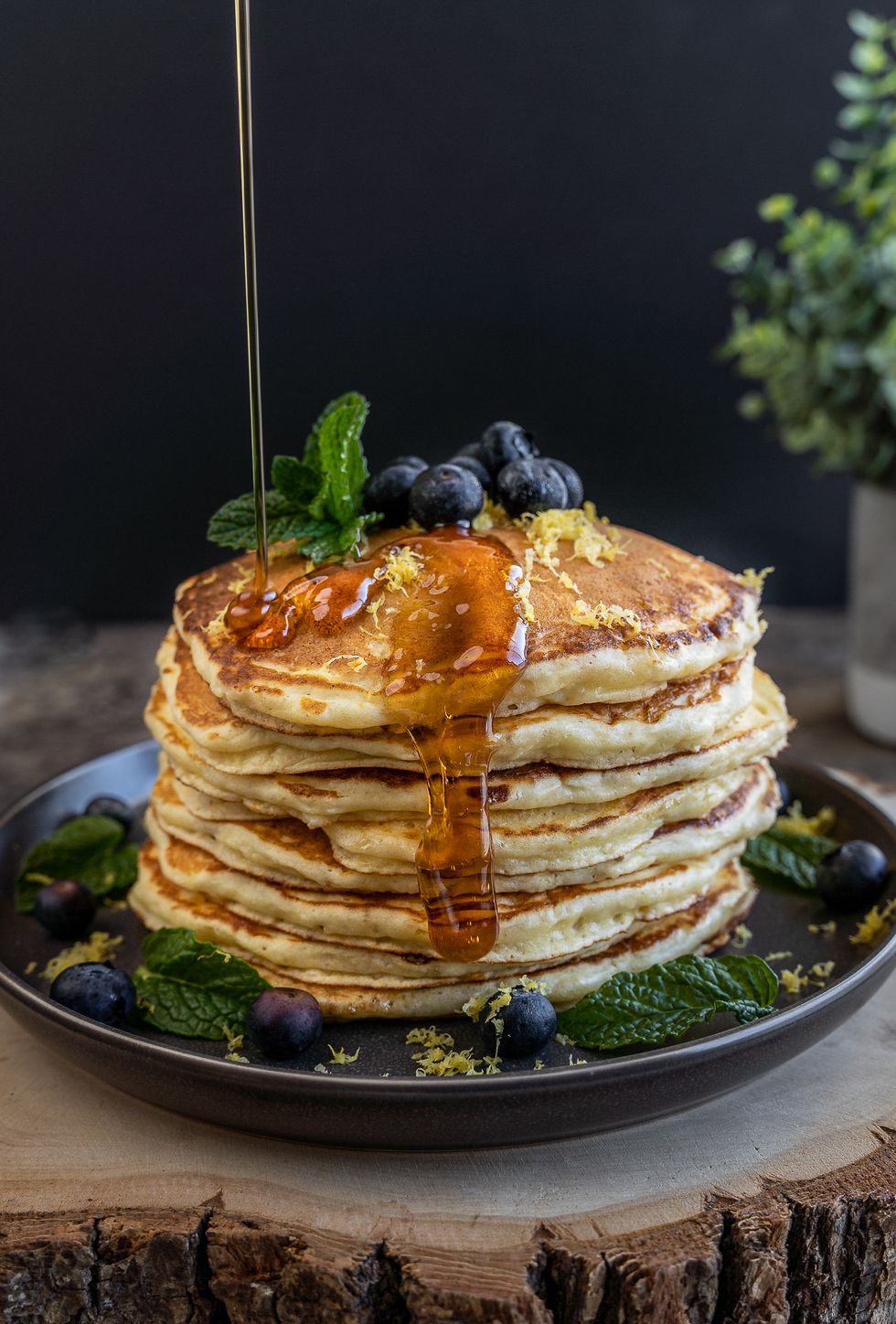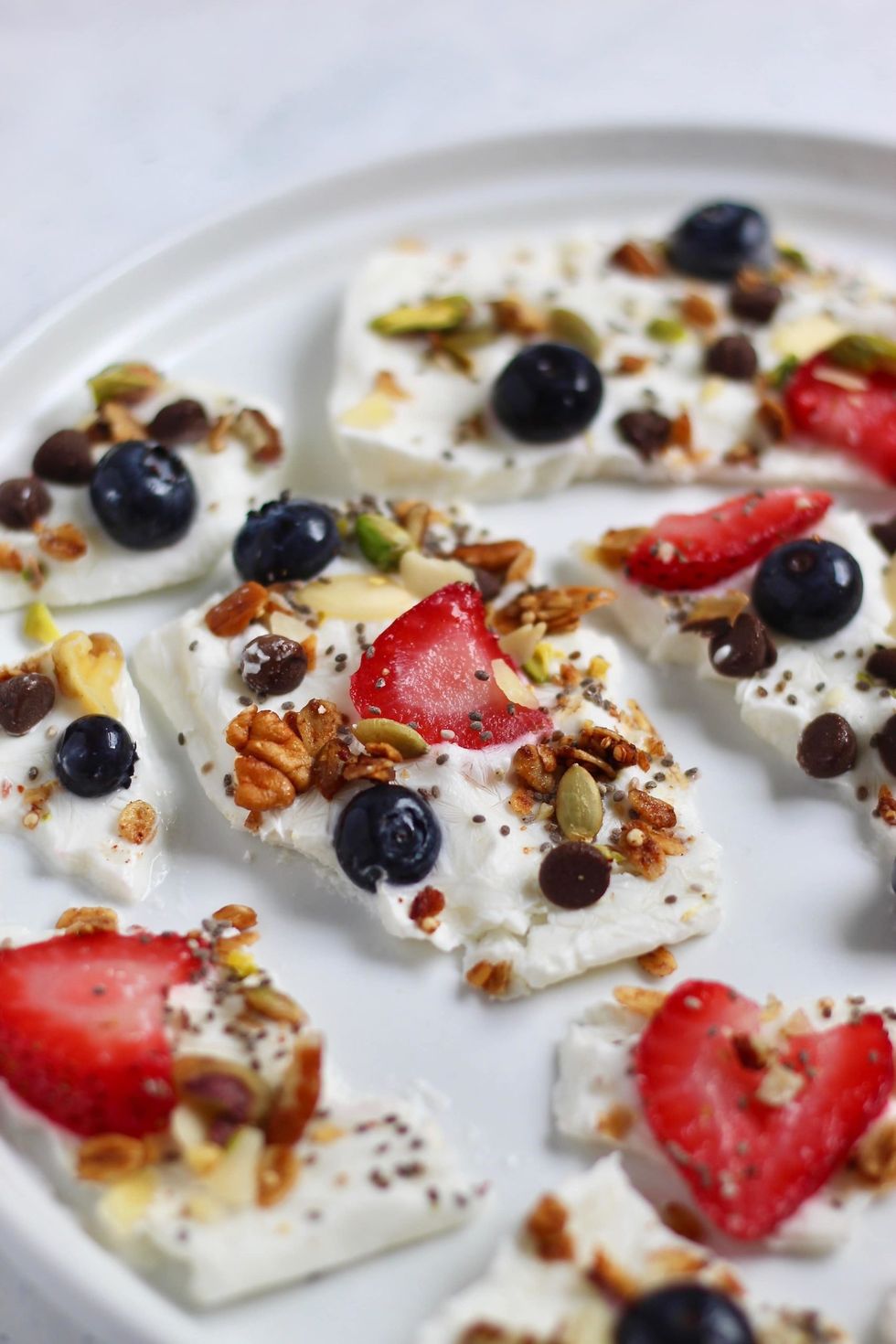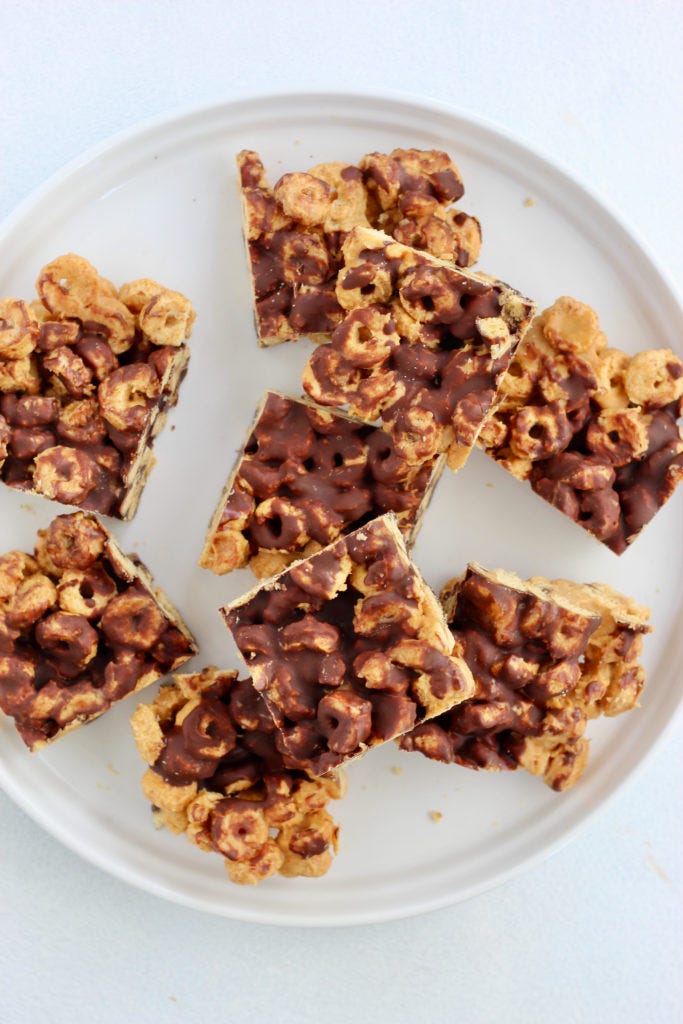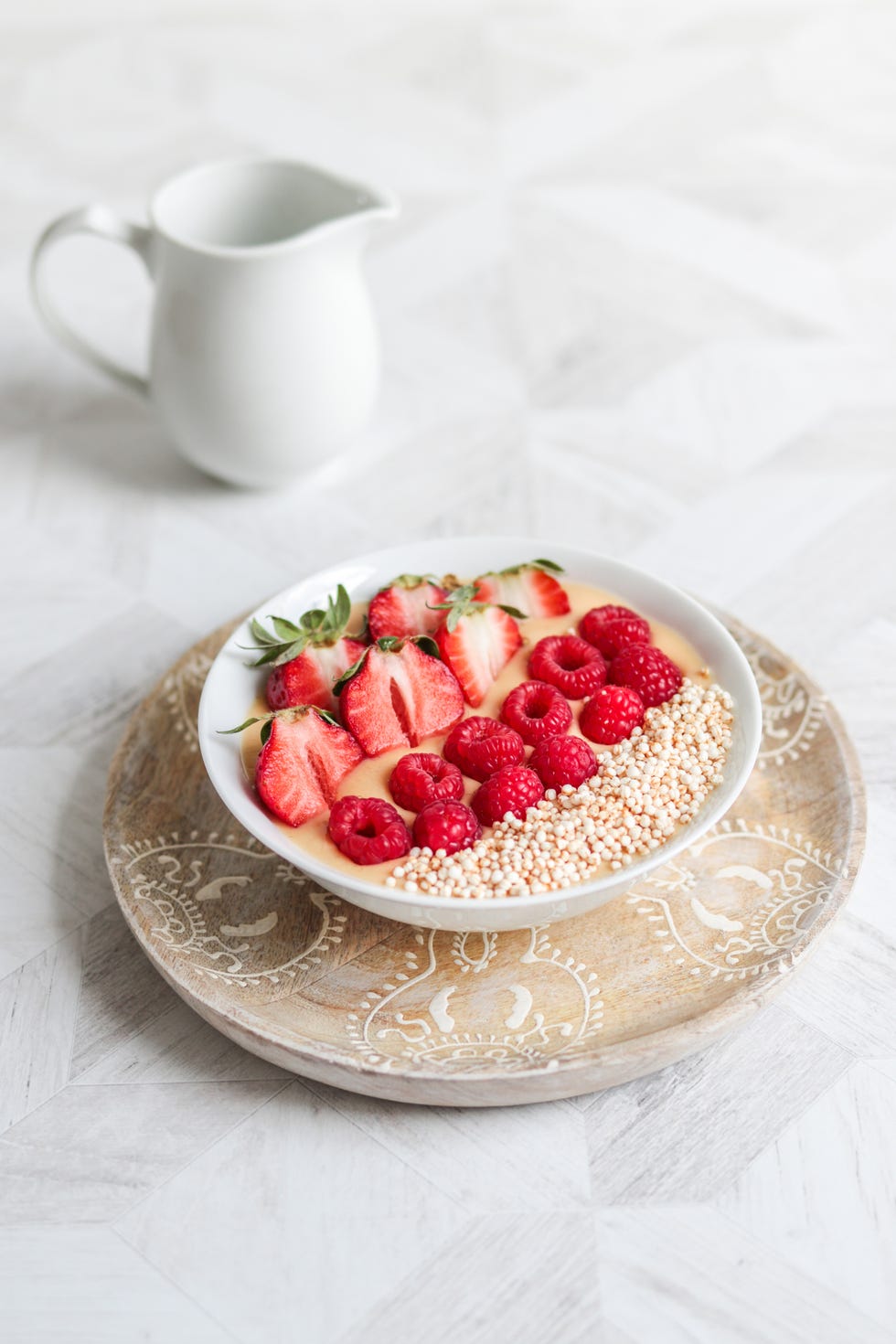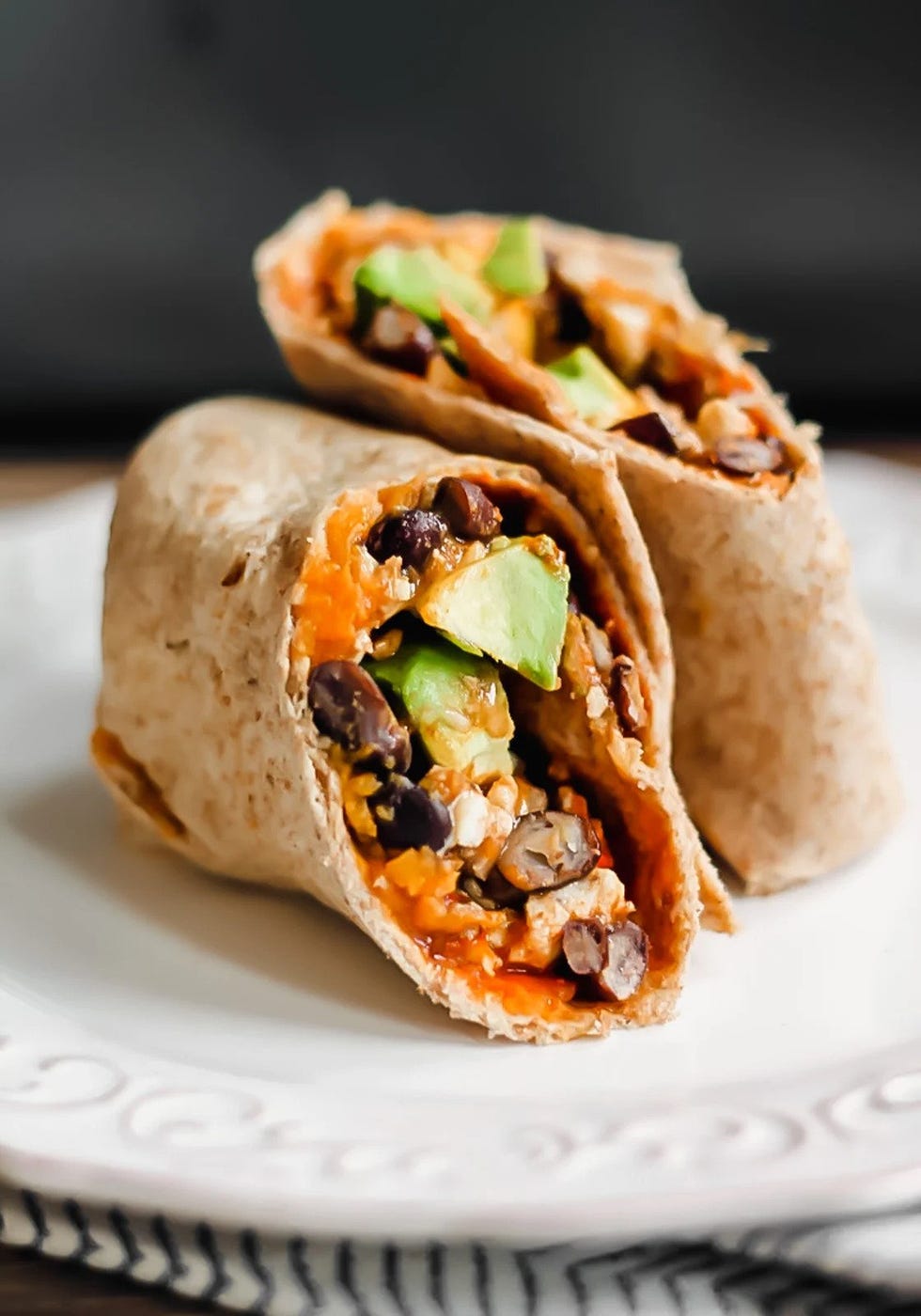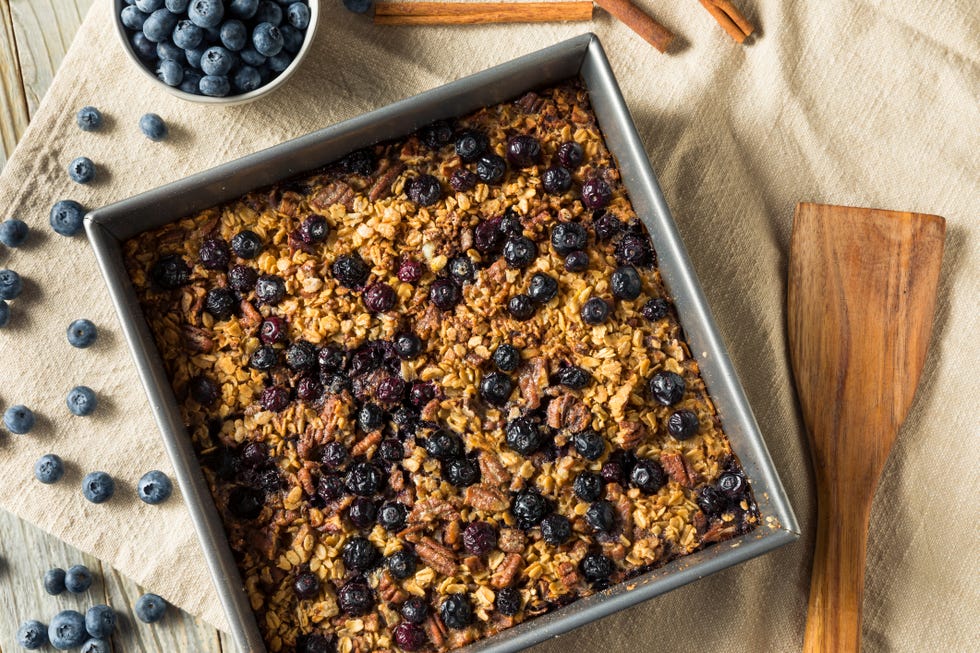50 high-protein breakfasts to keep you full for hours, according to dietitians
There is nothing worse than making yourself breakfast in the morning just to get to work and realise you’re hungry again.
Not all breakfasts are equally filling, but if you focus on packing the most important meal of the day with protein, you won’t be searching for an AM snack by the time you get to your desk.
Your body needs a steady supply of protein all day long, but it’s especially important to get enough in the morning.
‘It’s like filling your gas tank before a road trip,’ says Amanda Sauceda, RD, the founder of the nutrition blog The Mindful Gut. Increasing the amount of protein in your diet even slightly, from 18% to 20% of your total calories for the day, can help improve the quality of food choices you make, including fewer refined grains and added sugar and more green veggies, a 2022 study published in Obesity found.
Breakfast is the perfect meal to target for some extra protein; about three quarters of total protein intake is consumed at lunch and dinner, according to 2016 data from Food Surveys Research Group.
Protein is important for muscle strength and repair, says Mackenzie Burgess, RDN, of recipe blog Cheerful Choices. So, if bulking is one of your fitness goals, you need to work more protein into your diet, stat. ‘Protein supplies our body with amino acids needed for the production of numerous important hormones, such as insulin,’ which can stimulate skeletal muscle protein synthesis, she says.
Meet the experts: Amanda Sauceda, RD, is the founder of The Mindful Gut. Mackenzie Burgess, RDN, is the owner of Cheerful Choices. Roxana Ehsani, RD, CSSD, LDN, is a nutritionist and national media spokesperson for the Academy of Nutrition and Dietetics. Kelsey Lorencz, RDN, is a nutritionist and owner of Eating With Heart Nutrition.
Another reason to stock up on this macronutrient? Protein helps with blood sugar control, as it takes longer for your body to digest and absorb. It hits your bloodstream at a slower rate, providing a steady, prolonged source of energy, says Roxana Ehsani, RD, a national media spokesperson for the Academy of Nutrition and Dietetics. As a result, you’ll be less likely to mindlessly snack.
Now, when it comes to getting good quality protein at breakfast, eggs are an obvious choice, but Burgess also recommends levelling up your intake by trying Greek yoghurt, smoked salmon, protein powders, nuts, and nut butters. It’s also important to incorporate a mix of fibre-loaded, plant-based protein like peas, spinach, avocado, and lima beans, adds Sauceda. However you do it, add more protein to your diet; your body will thank you.
How much protein you should eat in the morning
‘Eating 15 to 30 grams of protein at breakfast is a great way to regulate your blood sugar and stay satisfied and focused throughout the morning,’ reiterates Kelsey Lorencz, RDN, the founder of Eating With Heart Nutrition. ‘Protein helps slow down the digestion and absorption of carbs, so you’ll feel more energised and alert after your meal.’
Bonus? If you want to lose weight, protein has the added benefit of helping you preserve lean muscle mass while losing fat, she notes. While the actual amount of protein you need depends on your current body weight, Lorencz says including at least 15 to 20 grams in your meals and an extra five to 10 grams in your snacks can help you maintain energy (and satiety) throughout the day.
The benefits of eating protein at breakfast
Not only does protein keep you satisfied and satiated, but, again, protein can also help you eat less throughout the day. Researchers found that eating a high-protein breakfast had a statistically significant increase on GLP-1 levels compared to eating a high-carbohydrate one in a 2019 study published in Clinical Nutrition Experimental. (The GLP-1 hormone is the one weight loss drugs like Ozempic and Wegovy mimic to keep you fuller.) Bonus, the levels of GLP-1 were found to increase even more in women who ate a high-protein breakfast compared to men.
It also might help you burn a little more calories, according to a 2020 study in the Journal of Obesity and Metabolic Syndrome. Everything you eat takes a certain amount of energy to digest, and protein requires the most energy, taking up 20% to 30% of what you just consumed to break it down. Compare this to 5% to 10% of the energy from carbs and 0% to 3% for fat, per the study.
50 best high-protein breakfast ideas
Still, if you’ve ever tried following a high-protein diet (or simply eating more of the macro), you know that increasing your protein intake isn’t always easy, especially if you don’t have your recipe arsenal stocked with high-protein breakfast ideas.
Enter: nutritionists, bloggers, and chefs. They’re here to offer their high-protein breakfast ideas, from sweet and savoury options to vegan or paleo picks. Just keep in mind that the nutrition facts are approximate – some of the numbers might change depending on the specific brands you choose. The best part? There’s something everyone will love on this list.
1. Protein oatmeal muffins
Credit Jennifer K Rakowski//Getty Images
Homemade muffins made with eggs, fruit, oats, and protein powder make for a great grab-and-go, protein-packed breakfast, says Maggie Michalcyzk, RDN, the recipe developer behind Once Upon a Pumpkin. ‘Easy to make ahead of time, protein oatmeal muffins can be flavoured with different fruit like banana, apples, blueberries, and pumpkin,’ she says. So, basically anything you have in your fridge. Plus, protein oatmeal muffins pair perfectly with a spoonful or two of your favourite nut butter for an additional punch of added protein. Yum!
Per serving: 175 calories, 15g protein, 3g fat, 25g carbs, 4g fibre
2. Power breakfast bowl
Kanok Sulaiman//Getty Images
Made with salami, avocado, hard-boiled eggs, olives, spinach, and tomatoes, then topped with a drizzle of Italian dressing, this breakfast bowl will keep you satiated and satisfied. Adding a hard-boiled egg and salami slices takes the protein up a notch, giving this bowl more staying power for your morning.
Per serving: 273 calories, 23g protein, 13g fat, 24g carbs, 8g fibre
3. Breakfast quesadilla
burwellphotography//Getty Images
Skip the usual slices of toast and instead, make a high-protein breakfast quesadilla using black beans, cheese, scrambled eggs, spinach, turkey bacon, and whole-wheat tortillas. Place on a pan to heat until the cheese is melted and then top with sliced avocado. ‘Black beans are a great source of plant-based protein,’ says Michalcyzk, ‘in addition to the protein in these quesadillas from the eggs and turkey bacon [too].’
Per serving: 360 calories, 17g protein, 6g fat, 40g carbs, 11g fibre
4. Breakfast wrap
LauriPatterson//Getty Images
Spread hummus on a whole-grain tortilla and top with avocado, cheese, chicken breast or turkey slices, and spinach for a satisfying and protein-packed breakfast that is easy to make and completely customisable based on what you have on hand.
Michalcyzk adds that ‘hummus helps to add more protein to anything’. So if you are looking for a low lift way to add more protein to breakfast or any meal for that matter, try a dollop or two of hummus.
Per serving: 246 calories, 21g protein, 10 g fat, 35g carbs, 8g fibre
5. Blueberry protein oatmeal
REDA&CO//Getty Images
Oatmeal on its own is a delicious breakfast full of fibre and whole grains, but you can round it out and amp up the nutrition by adding protein-packed ingredients like ground flaxseed, chia seeds, soy or almond milk, or protein powder, says Kimberly M. Neva, RD, a nutritionist and bariatric specialist at Rush University Medical Center. Her favourite is 42g oats topped with one scoop protein powder, one tablespoon of flaxseed, and 63g blueberries. That’s right, you can stir flavoured or unflavoured protein powder right into your oatmeal.
Per serving: 329 calories, 21g protein, 11g fat, 50g carbs, 8g fibre
6. Oat yoghurt cups
Zolga_F//Getty Images
Another option to increase the protein in your oatmeal is to add a couple of dollops of Greek yoghurt, Neva says. Sprinkle with cinnamon for extra flavour. ‘This packs 11g of protein per serving and is easy to take on the road with you,’ she says. ‘Plus, you get filling fibre and healthy probiotics.’ One serving is 42g oats and 113g of flavoured, low-fat Greek yoghurt.
Per serving: 196 calories, 15 g protein, 5 g fat, 33 g carbs, 6 g fibre
7. Eroica natural protein bar
No time to make breakfast? Consider a well-rounded protein bar, like one of these Eroica natural protein bars. They lean on simple ingredients – egg whites, coconut sugar, nutmeg – to provide you with enough energy to fuel your morning until you can settle in for a solid lunch. You could always pair half of one with a banana or apple for a more well-rounded nosh.
Per serving: 210 calories, 12g protein, 9g fat, 23g carbs, 5g fibre
8. Mini egg frittatas
Carlos Osorio//Getty Images
If eggs for breakfast sounds boring, try these individual frittatas, Neva says. Mix two whole eggs and one extra egg white together with two ounces of sautéed vegetables. For even more protein, add 85g of of turkey sausage. Simply pour the mixture into muffin tins and bake at 180°C until you can insert a knife in them and it comes out clean (in a standard-size muffin tin, that will be about 20 to 25 mis). One serving is two egg cups. These are a perfect option if you’re not a morning person, as they can be made ahead and then reheated quickly on your way out the door, she adds.
Per serving: 353 calories, 31g protein, 17g fat, 17g carbs, 2g fibre
9. Turkish fried egg
REDA&CO//Getty Images
Looking for a unique flavour? Try this modified version of a popular Turkish dish, courtesy of Marina Rösser, a senior nutrition specialist for the fitness and diet app Freeletics. Sauté red onion, garlic, frozen spinach, and sliced chilli peppers in a little olive oil. Once the veggies are soft, add an egg and finish cooking. Top with full-fat Greek yoghurt, lemon juice, and salt. ‘The combination of creamy yoghurt, fragrant olive oil, spicy chilli, and lemon is irresistible,’ she says.
Per serving: 200 calories, 15g protein, 12g fat, 11g carbs, 1g fibre
10. Cottage cheese bowl
RondaKimbrow//Getty Images
There’s a reason low-fat cottage cheese is trending right now. The nutrition, taste, cost, and ease of preparation make it a great addition to your breakfast rotation, Rösser says. (Note: low-fat cottage cheese has more protein per serving than full-fat, although both are great options.) She recommends filling a bowl with 200g of cottage cheese, mixing in 43g of black beans, and topping with tomatoes, paprika, salt, and pepper.
Per serving: 240 calories, 28g protein, 5g fat, 20g carbs, 4g fibre
11. Chocolate peanut butter porridge
NataBene//Getty Images
Sometimes you just have to have something sweet for breakfast and with this simple dish you can have your protein and the taste you crave, Rösser says. Mix together 75g of cooked oats, two tablespoons natural peanut butter, one teaspoon dark cacao powder, and 1/2 banana. Top with yoghurt or your choice of milk.
Per serving: 363 calories, 16g protein, 20g fat, 52g carbs, 4g fibre
12. Minty quark shake
Amguy//Getty Images
Never heard of quark? It’s a German-style yoghurt, similar to Greek yoghurt, but with more protein and a texture like cheesecake. This thicker consistency makes it ideal for whipping up a decadent, creamy protein shake. Rösser’s favourite concoction: 125g of Quark, 38g of cucumber, a few mint leaves, 60ml of milk, and a pinch of salt.
Per serving: 109 calories, 15g protein, 3g fat, 6g carbs, 0g fibre
13. Shakshuka
barol16//Getty Images
This egg, onion, and tomato dish is a breakfast staple across the Middle East. In fact, the name literally means ‘breakfast’, Rösser says. Simply cook a sauce of 25g of sliced onions, 1/2 sliced red bell pepper, one tomato, and 1/4 teaspoon paprika. Place two cooked eggs on a slice of whole-grain bread and smother it in the sauce. Top with parsley leaves, chilli flakes, salt, and pepper for more flavour.
Per serving: 237 calories, 17g protein, 10g fat, 21g carbs, 4g fibre
14. Crunchy scrambled eggs
photohomepage//Getty Images
Take your basic scrambled eggs to the next level by adding two tablespoons of seeds (pumpkin, sunflower seeds, and/or flax), four chopped cherry tomatoes, and 5g of rocket to two cooked eggs. This combo adds protein, fibre, flavour, and a satisfying crunch to an otherwise ordinary dish, Rösser says.
Per serving: 219 calories, 16g protein, 16g fat, 3g carbs, 1g fibre
15. Smoked salmon toast
kajakiki//Getty Images
Fish is an excellent breakfast food. Not only does it have a tonne of protein, but the healthy omega-3 fats can help everything from your skin to your brain. Breakfast is all about simplicity, so Rösser recommends keeping things easy by putting 85g of smoked salmon or trout on one slice of whole-grain toast. Optional toppings include cottage cheese, grated horseradish, dijon mustard, chopped parsley, chopped dill, chopped chives, lemons, or salt and pepper.
Per serving: 169 calories, 20g protein, 5g fat, 11g carbs, 2g fibre
16. Hot honey broiled pineapple toast
Nico Schinco
This recipe is the perfect combo of sweet, spicy, creamy, and crunchy. Drizzle hot honey over 55g of pineapple chunks spaced evenly on a baking sheet. Broil for 11 mins, or until golden brown. Scoop three tablespoons of cottage cheese on whole-grain toast. Top toast with pineapple, extra honey, and Aleppo pepper if desired. (We recommend it.)
Per serving: 264 calories, 10g protein, 7.5g fat, 41g carbs, 4g fibre
17. Yoghurt parfait
LauriPatterson//Getty Images
Start your morning off right with a simple parfait made of a container of plain Greek yoghurt, 38g of berries berries and 30g of muesli, says Sonja Kukuljian, PhD, RD, the director of science and nutrition at Noumi. Muesli is a whole-grain cereal often eaten uncooked. There are lots of variations, so pick one high in fibre and low in sugar; Kukuljian suggests one containing barley, since it’s got both fibre and protein.
Per serving: 188 calories, 7g protein, 8g fat, 23g carbs, 3g fibre
18. Poached eggs on sourdough
olgna//Getty Images
Put a twist on standard eggs by poaching an egg and adding a little vinegar to the water, Kukuljian says. Add a slice of whole-grain sourdough toast (a source of pre- and probiotics) and one teaspoon of olive oil, and you’ve got a healthy, filling meal.
Per serving: 173 calories, 9g protein, 9g fat, 15g carbs, 2g fibre
19. Crustless mini quiches
Lauri Patterson//Getty Images
You can’t go wrong with eggs and veggies in the morning, and you can get both in these grab-and-go crustless quiches, says certified nutrition specialist Jennifer Clemente, who runs Body Bliss Nutrition. Simply mix six eggs with any type of vegetables you like – she likes to add 50g of chopped sweet potato, one asparagus spear, 35g of kale, and 38g of red onion – and add seasonings like garlic, sea salt, parsley, and coriander. Bake in the oven at 180°C until you can insert a knife in them and it comes out clean. This makes three servings loaded with fibre, protein, and an incredibly wide range of nutrients including vitamins A, C, E, K, B1, B2, B6, and B12, as well as folate and chromium, she says.
Per serving: 190 calories, 12g protein, 9g fat, 11g carbs, 2g fibre
20. Collagen shake
Edalin//Getty Images
In the world of protein powders, collagen deserves more love, Clemente says. Collagen powder is pure protein that’s flavourless and dissolves well in shakes. She likes to blend two scoops unflavoured collagen powder with 250ml plant milk, 75g of berries, one tablespoon chia seeds, and one tablespoon nut butter.
Per serving: 384 calories, 32g protein, 18g fat, 22g carbs, 11g fibre
21. Amped-up avocado toast
DronG//Getty Images
Avocado toast has long been a trendy breakfast food, and with good reason. It provides a healthy dose of fats and fibre. But it can be improved, says Alana Kessler, RDN, the founder of Be Well by Alana Kessler. Give yours a nutritional boost by putting one cooked egg and 1/4 avocado on top of one slice of whole-grain toast and sprinkling with one tablespoon of nutritional yeast. This adds filling protein and B vitamins.
Per serving: 270 calories, 15g protein, 15g fat, 20g carbs, 8g fibre
22. Protein pancakes
MusicianAtHeart//Getty Images
Your fave breakfast dish is packed with protein courtesy of this recipe from Charlie Seltzer, MD, a doctor specialising in weight loss. Simply blend these ingredients until smooth: 125g each of egg whites, oatmeal, and 1% cottage cheese, along with one teaspoon baking soda. Cook the batter like a pancake, approximately one minute each side or until browned. These pancakes contain lots of protein for the amount of calories.
Per serving: 320 calories, 35g protein, 5g fat, 32g carbs, 4g fibre
23. Chocolate pomegranate overnight oats
nata_vkusidey//Getty Images
If cooking oatmeal in the mornings sounds like a pain (no judgment here!), overnight oats are the perfect solution. Try this nutrient-rich, protein-packed variety, courtesy of Lauren Harris-Pincus, RDN, the author of The Protein-Packed Breakfast Club. Combine 30g of oats, 250ml unsweetened almond milk, 113g of plain Greek yoghurt, one teaspoon chia seeds, one scoop chocolate whey protein powder, and a sprinkle of pomegranate seeds. ‘The balance of protein and fibre from the oats and fruit will delay digestion and help to keep your energy levels up much longer than a high-carb meal, plus the chia seeds absorb up to 10 times their weight in water to help keep you full,’ she says.
Per serving: 415 calories, 30g protein, 15g fat, 42g carbs, 8g fibre
24. Frozen protein waffles + toppings
Victoria Pearson//Getty Images
And you thought frozen waffles were a thing of your middle school past. Pop two high protein frozen waffles in the toaster for a breakfast that will keep you fuelled until lunch. Want to up the ante on your protein content even more? Spread with nut butter, add a dollop of Greek yoghurt, and a sprinkle of hemp seed, and hit the road.
Per serving (2 waffles): 240 calories, 12g protein, 12g fat, 27g carbs, 3g fibre
25. Protein breakfast sandwich
LauriPatterson//Getty Images
When you hear ‘breakfast sandwich’, you probably think egg McMuffins. Seltzer’s sandwich recipe, however, packs in the protein and fibre for minimal calories without sacrificing taste. Start with one toasted high-fibre English muffin. Add an egg, a slice of cheese, and two slices of ham.
Per serving: 365 calories, 30g protein, 18g fat, 27g carbs, 8g fibre
26. Eggs-n-greens
OksanaKiian//Getty Images
Leafy green vegetables are one of the best foods you can eat for your health. Try them as a nest for eggs, as recommended by Brooke Alpert, RD, the author of The Diet Detox. Grab several large handfuls of greens (spinach, kale, mustard), and put in a hot pan. Stir until wilted, about one minute. Top with two eggs cooked to runny-yolked perfection. Add a little salt and pepper, and enjoy.
Per serving: 192 calories, 15g protein, 8g fat, 14g carbs, 2g fibre
27. PB banana protein flatbread
Valeriia Sviridova / EyeEm//Getty Images
Toast a high-fibre flatbread for three to four mins. Combine three tablespoons powdered peanut butter, one tablespoon vanilla protein powder , and honey, adding two to three tablespoons water and stirring until it’s spreadable but not runny. Spread mixture onto the flatbread and top with a 1/2 a banana, sliced, and a sprinkle of cinnamon.
Per serving: 200 calories, 19g protein, 5g fat, 22g carbs, 8g fibre
28. Omelette
violleta//Getty Images
Omelettes are a great way to combine eggs with flavourful veggies, meats, and cheeses for a protein-packed nutritious breakfast. ‘My favourite omelette is two eggs cooked with 25g of mushrooms, 38g of chopped onions, and 28g of feta cheese, topped with basil and tomatoes,’ says Elin Östman, PhD, a nutrition researcher and the founder of Good Idea. ‘Eggs are a great source of protein, the different coloured veggies are packed with polyphenols, and the cheese provides calcium and flavour.’
Per serving: 215 calories, 16g protein, 15g fat, 5g carbs, 1g fibre
29. Tofu scramble
Sohadiszno//Getty Images
Surprise: scrambles don’t have to be eggs. You can still get the flavour and protein by subbing 180g of tofu for eggs, says Shahzadi Devje, RD, a nutritionist and certified diabetes educator in Canada. Not only does tofu provide protein, but it’s also a great source of calcium, magnesium, iron, and zinc, she says. All you do is mash firm tofu and stir in a mixture of sautéed onion, garlic, and red bell pepper (or your veggies of choice). Then cook on the stove. She recommends serving your scramble with either sprouted grain bread, roti, or breakfast potatoes.
Per serving: 153 calories, 16g protein, 8g fat, 7g carbs, 4g fibre
30. Protein-packed cereal bowl
wilatlak villette//Getty Images
‘If you love cereal but need more protein in your breakfast, this protein-packed cereal bowl recipe holds the secret,’ Harris-Pincus says. Simply whisk three tablespoons of your favourite protein powder into 250ml unsweetened plant-based milk (try coconut). Pour over a fibre-rich whole-grain cereal, with some berries and chia seeds for extra crunch and staying power.
Per serving: nutrition facts depend on cereal, protein powder, milk, and toppings chosen
31. Almond butter crackers
olindana//Getty Images
Want something simple, protein-packed, and filling that doesn’t require any prep or cooking? Devje’s favourite super-easy breakfast is two crackers spread with two tablespoons of almond butter and sprinkled with one tablespoon each of seeds and dried fruit. Add a glass of soy milk and you have a serving of protein in less time than it takes you to look up a recipe.
Per serving: 357 calories, 12g protein, 22g fat, 35g carbs, 7g fibre
32. Vanilla almond chia pudding
Julia_Sudnitskaya//Getty Images
Chia seeds are packed with protein and fibre, but that’s not what makes them special –foodies love them for their ability to add a pudding-like texture to sweet treats. Try this recipe from Danielle Judson, RDN, a plant-based nutritionist and culinary consultant. Combine three tablespoons chia seeds with 250ml unsweetened almond milk (or any other plant-based milk of choice), two tablespoons almond butter, one teaspoon vanilla extract, and a dash of cinnamon in a mason jar. Stick the entire thing in the fridge overnight. In the morning, add a sprinkle of blueberries and almonds, and you’ve got breakfast pudding to go.
Per serving: 446 calories, 17g protein, 35g fat, 29g carbs, 22g fibre
33. Vegan hummus toast
If you’re into savoury breakfast, a slice of hummus toast will satisfy your craving and fill you up. Toast two slices of sprouted wheat bread, then top with 63g of hummus, one tablespoon hemp seeds, and one tablespoon roasted, unsalted sunflower seeds for an added protein boost.
Per serving: 316 calories, 19g protein, 16g fat, 24g carbs, 11g fibre
34. Bread pudding in a mug
Manny Rodriguez//Getty Images
Bread pudding is the ultimate comfort food in the morning, but it doesn’t have to be a calorie bomb. Indulge in this healthy version from Harris-Pincus. Mix one egg, two tablespoons vanilla whey protein powder, honey, and two tablespoons milk. Fold in 45g of chopped apple and one slice of cubed whole-grain bread. Pour in a mug, and microwave for one minute. Top with cinnamon.
Per serving: 291 calories, 32g protein, 8g fat, 23g carbs, 3g fibre
35. Breakfast wrap
A_Lein//Getty Images
113g of smoked salmon on one paleo wrap with roasted vegetables, greens, and 1/4 avocado is the go-to breakfast for chef Elizabeth Trattner. ‘This yummy wrap is high in healthy fats and fibre,’ she says. The best part, however, is how customisable this is. Swap out the low-carb wrap for a whole-grain option, trade the salmon for chicken or eggs, and use any type of veggies you like.
Per serving: 327 calories, 29g protein, 16g fat, 22g carbs, 15g fibre
36. Hard-boiled eggs and quinoa
Bartosz Luczak//Getty Images
Make a big batch over the weekend. Bring water to rolling boil on stove, place six eggs in pan, cover, and remove from heat. Let it sit for 12 mins. Pair two hard-boiled eggs with 93g of cooked quinoa, which is also high in protein (and can be made sweet with a dusting of cinnamon and a drizzle of honey, if you wish), and berries.
Per serving: 237 calories, 15g protein, 10g fat, 20g carbs, 3g fibre
37. Protein oatmeal or “proats”
OatmealStories//Getty Images
‘Oatmeal is amazing for its versatility and heart health benefits but it’s light on protein,’ Harris-Pincus says. ‘An easy fix is to microwave an egg right in. To do it, add 125ml of your milk of choice, 30g of rolled oats and a tiny bit of salt to a medium microwavable bowl and stir. Cook one minute and 30 seconds, stir in a beaten egg, and microwave for another 30 to 45 seconds.’ Want something extra? Go ahead and add desired toppings such as berries, chocolate chips, nuts, or seeds.
Per serving with 2% milk: 174 calories, 11g protein, 1g fat, 15g carbs, 1g fibre
38. Breakfast tacos
rez-art//Getty Images
Tacos are an anytime food, as shown by this recipe for breakfast tacos, courtesy of Jerlyn Jones, RDN, the owner of The Lifestyle Dietitian. Take one whole-grain wrap, add 43g of black beans, two scrambled eggs, lettuce, salsa, and 1/4 avocado. The beans and eggs provide protein, while the avocado provides healthy fats and the veggies bring the vitamins. Plus, it’s perfectly portable.
Per serving: 476 calories, 22g protein, 20g fat, 47g carbs, 14g fibre
39. Crunchy toast
Manuta//Getty Images
Who doesn’t love toast in the morning? Especially with added protein and nutrients like Jones’ toast. Start with one slice of whole-grain bread, spread it with one tablespoon nut butter of your choice, and sprinkle with one tablespoon chia seeds. This combo provides protein along with a hefty dose of fibre and fats.
Per serving: 237 calories, 10g protein, 14g fat, 21g carbs, 10g fibre
40. Mediterranean muffins
Azurita//Getty Images
Eggs, canned salmon, and feta are the only ingredients in the Mediterranean breakfast muffins that Rima Kleiner, RD, the author of Dish on Fish, makes. They may be simple –combine two eggs, 57g of salmon, and 38g of feta and bake in muffin tins (set your oven to 180°C) for about 20 to 25 mins – but there’s nothing basic about their nutrition. They pack plenty of protein and healthy fats, all in a portable, tasty package. Make a large batch and freeze extras to be microwaved on busy mornings.
Per serving: 300 calories, 27g protein, 22g fat, 2g carbs, 0g fibre
41. Smoothie bowl
MarsBars//Getty Images
The ideal nutrient-dense, high-protein breakfast for Ehsani is a smoothie bowl made with 200g of cottage cheese or Greek yoghurt, 250ml of non-dairy milk, two handfuls of leafy greens like baby spinach or baby kale, a small frozen banana or 82g of frozen mango, and 150g of berries. Blend and top with your favourite seeds, nut butters, and coconut flakes. You’ll get a healthy dose of protein, dietary fibre, and heart-healthy fats as well.
Per serving: 404 calories, 34g protein, 20g fat, 53g carbs, 11g fibre
42. Greek yoghurt bowl
ATU Images//Getty Images
Greek yoghurt is a great way to take in a large amount of protein first thing in the morning. To make a quick and easy breakfast, spoon some Greek yoghurt in a bowl and top it with fresh fruit, honey, and a granola of your choice for a filling and satiating meal. This also travels well in any plastic container or jar with a lid.
Per serving: 252 calories, 25g protein, 11g fat, 45g carbs, 5g fibre
43. Avocado and smoked salmon bagel
LauriPatterson//Getty Images
A bagel with just cream cheese doesn’t pack quite enough protein to get you through your morning, says Ehsani. Try adding half of an avocado and smoked salmon to a fibre-packed whole-wheat bagel to level up your breakfast game.
Salmon is a high-quality source of protein, loaded with omega-3s and immunity-boosting vitamin D. Need a more on-the-go option? Use canned salmon. (FYI: a 170g can of wild sockeye salmon has 34g of protein, according to Ehsani!)
Per serving: 525 calories, 35g protein, 20g fat, 14g carbs, 14g fibre
44. Mushroom toast
Simon McGill//Getty Images
If you have leftover sautéed mushrooms from your dinner last night, save them for this quick and easy recipe. Just toast a piece of sprouted bread and add mushrooms and a slice of hard cheese like cheddar for a savoury and umami-flavoured breakfast. Ehsani recommends using cremini mushrooms and adding a fried egg on top for an extra boost of protein.
Per serving: 209 calories, 14g protein, 10g fat, 20g carbs, 3g fibre
45. Lemon ricotta pancakes
Adam Lanza / 500px//Getty Images
Elevate your favourite shop-bought pancake mix by adding 120g of ricotta cheese and one teaspoon of fresh lemon zest. Cook each pancake one minute per side and then top with fresh blueberries or another fruit of choice.
‘You can always add a scoop or two of chia seeds to the batter right before pouring on the griddle, this will add a dose of filling protein and a dose of anti-inflammatory fats too,’ says Ehsani.
Per serving: 421 calories, 22g protein, 18g fat, 43g carbs, 1.5g fibre
46. Yoghurt barks
Cheerful Choices
Simply spread an even layer of yoghurt onto a rimmed cookie sheet and top with chopped fruit and any nuts of your choice (Burgess recommends honey roasted pistachios or almonds for extra protein!). Freeze until solid before breaking into smaller pieces. You can make these breakfast or pre-workout treats ahead of time and store in the freezer for up to two months.
Per serving: 125 calories, 19g protein, 3g fat, 10g carbs, 3g fibre
47. Cereal bars
Cheerful Choices
Cereal bars aren’t just for the kiddos. Combine your favourite high-protein cereal with creamy nut butter, dark chocolate, and a touch of protein powder. Then freeze in a single layer before cutting into bars. ‘I always have these in my fridge to take on-the-go or enjoy as a healthy dessert,’ says Burgess.
Per serving: 230 calories, 10g protein, 13g fat, 21g carbs, 4g fibre
48. Quinoa breakfast bowl
MelanieMaya//Getty Images
Level up your regular bowl of oatmeal by making this healthier, high-protein grain bowl instead. Add hemp seeds, water, strawberries, and maple syrup to a blender and pour the mixture over some quinoa. Sprinkle your favourite toppings, and throw in a scoop of your favourite vanilla protein powder to the mixture if you want to up the protein count even more. ‘Protein powders can be a convenient option to help you hit your morning protein needs, especially for those who are busy and on-the-go,’ Burgess says.
Per serving: 493 calories, 20g protein, 20g fat, 60g carbs, 10g fibre
49. Breakfast burrito
Ambitious Kitchen
Prep this protein-packed, freezer-friendly recipe and be set for the week. Just lay out warm tortillas and evenly spread mashed sweet potato on the bottom, then scrambled eggs, diced avocados, black beans, and shredded cheese. Drizzle with enchilada sauce and season with salt and pepper. Tuck the ends in, roll up, and bake at 150°C for five to 10 mins.
Per serving: 398 calories, 18.1g protein, 13.8g fat, 54.3g carbs, 10.5g fibre
50. Baked oatmeal
Brent Hofacker / 500px//Getty Images
In a large bowl, mix together oats, protein powder, almond milk, peanut butter, eggs, maple syrup, coconut oil, vanilla, and salt. Then stir in blueberries and pour the mixture into a prepared baking dish. Top with additional blueberries and bake for 35 to 40 mins at 190°C. Drizzle with nut butter and enjoy! ‘Most nut butters contain anywhere from four to seven grams of protein per two-tablespoon serving,’ Burgess says.
Per serving: 313 calories, 17g protein, 13g fat, 37g carbs, 4g fibre
Related Stories
No Byline Policy
Editorial Guidelines
Corrections Policy
Source
